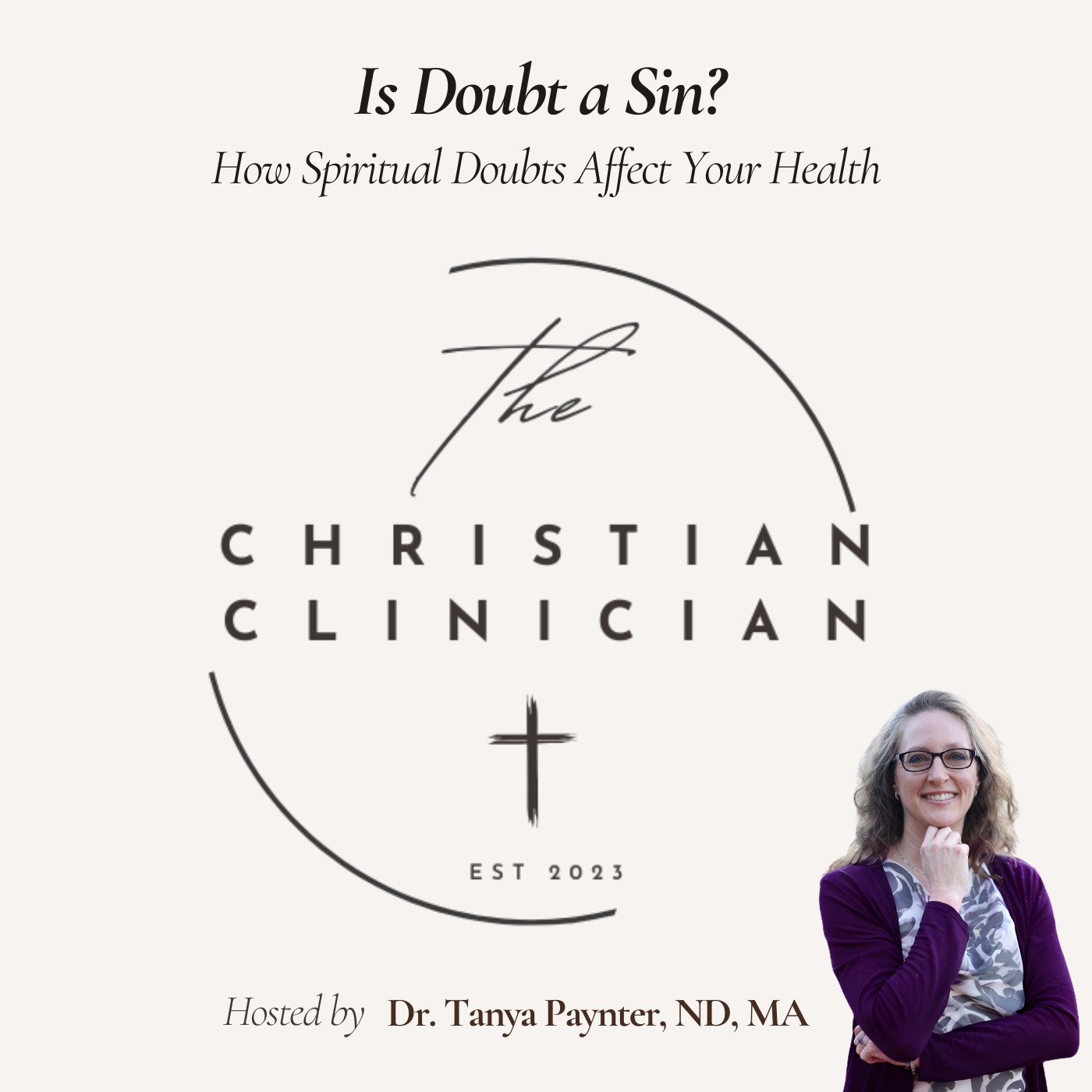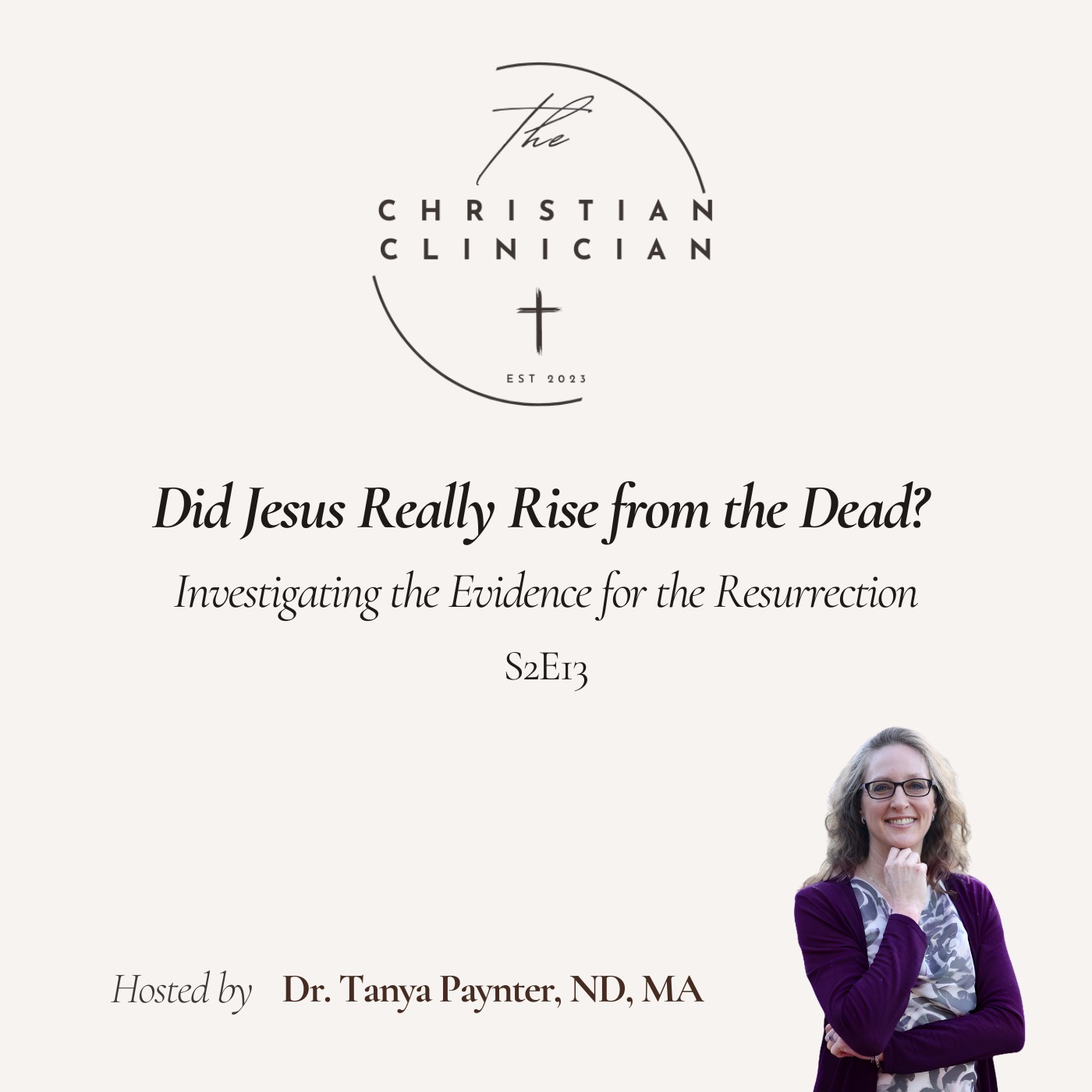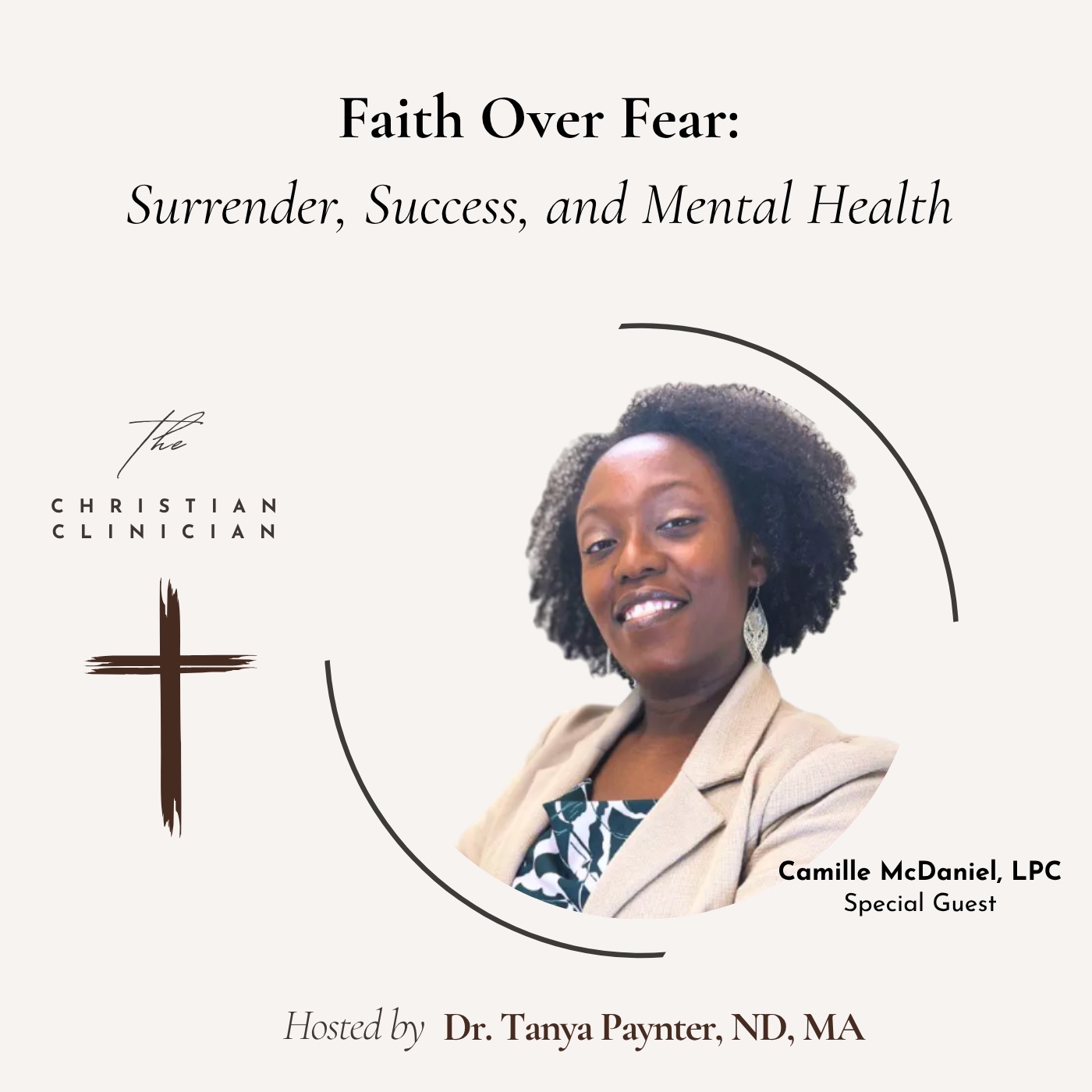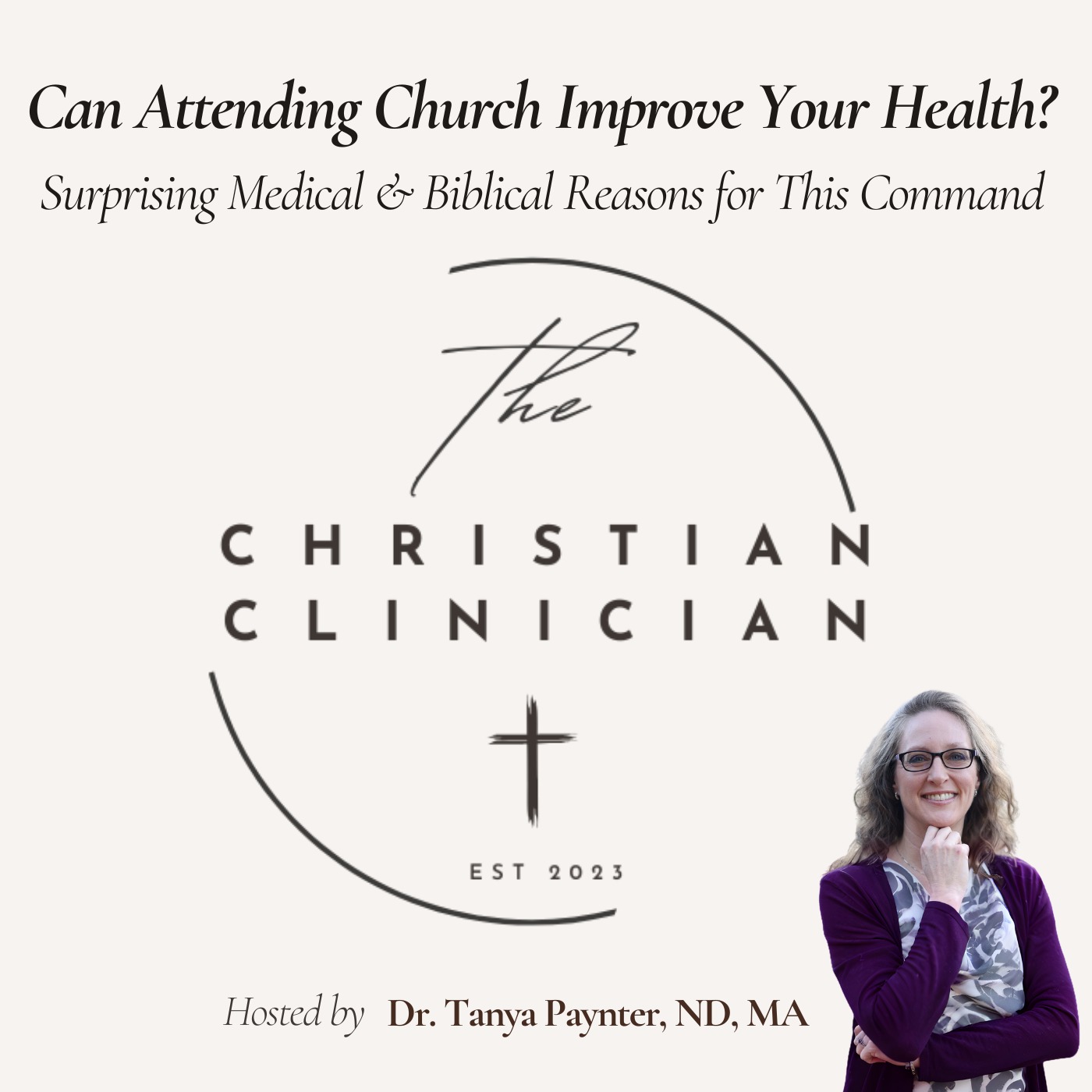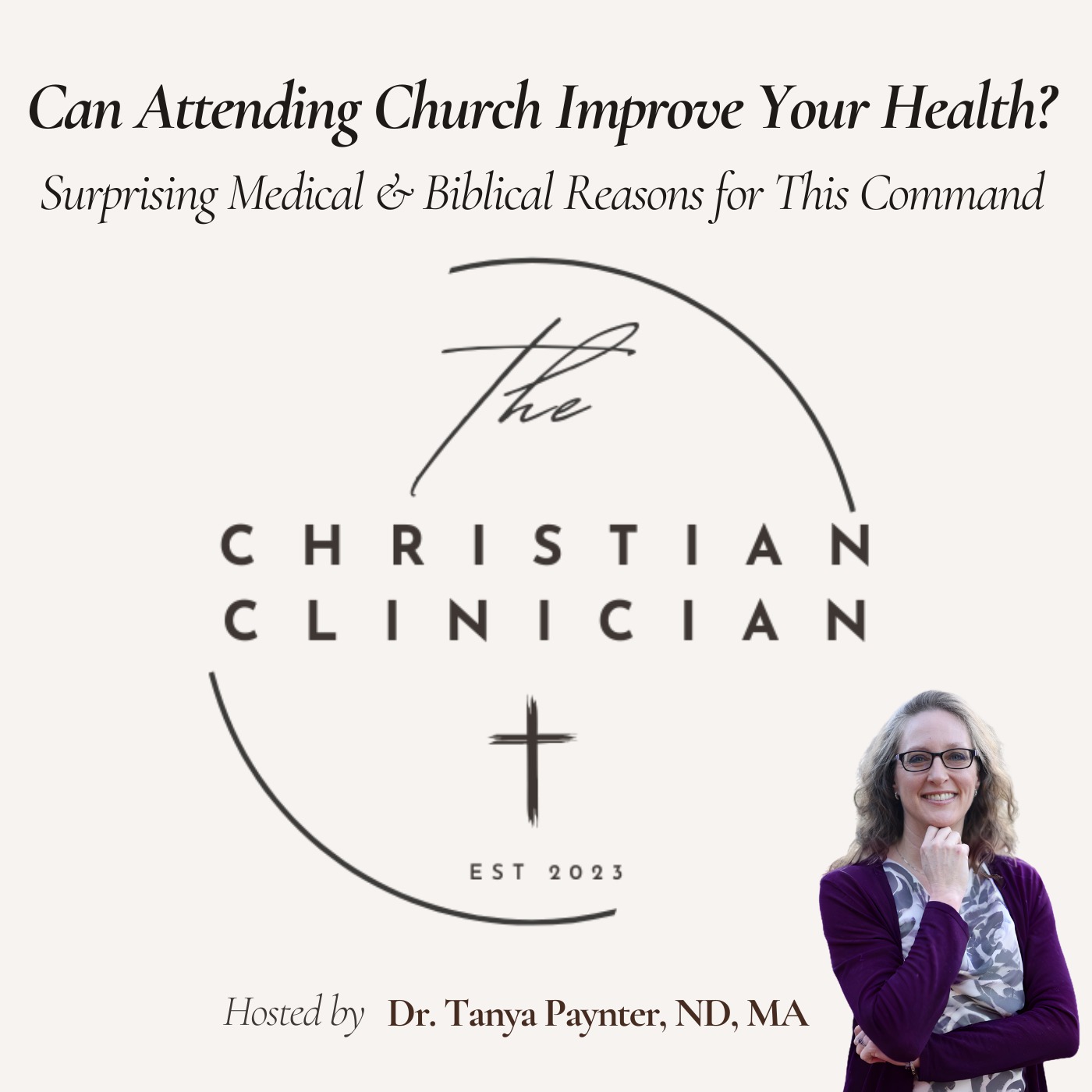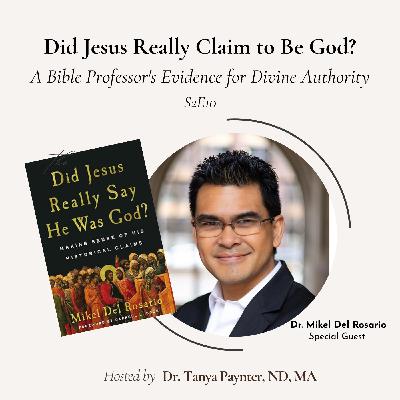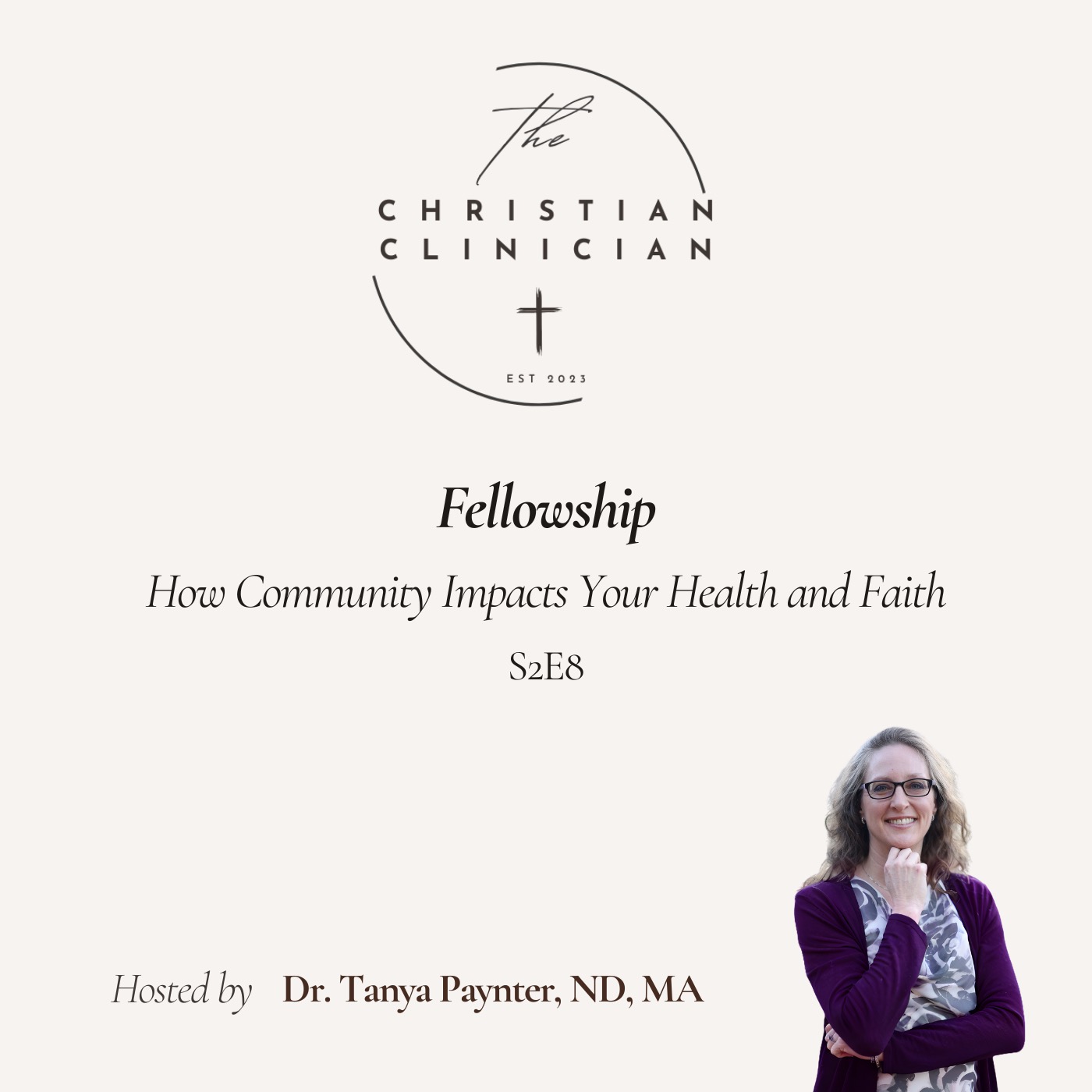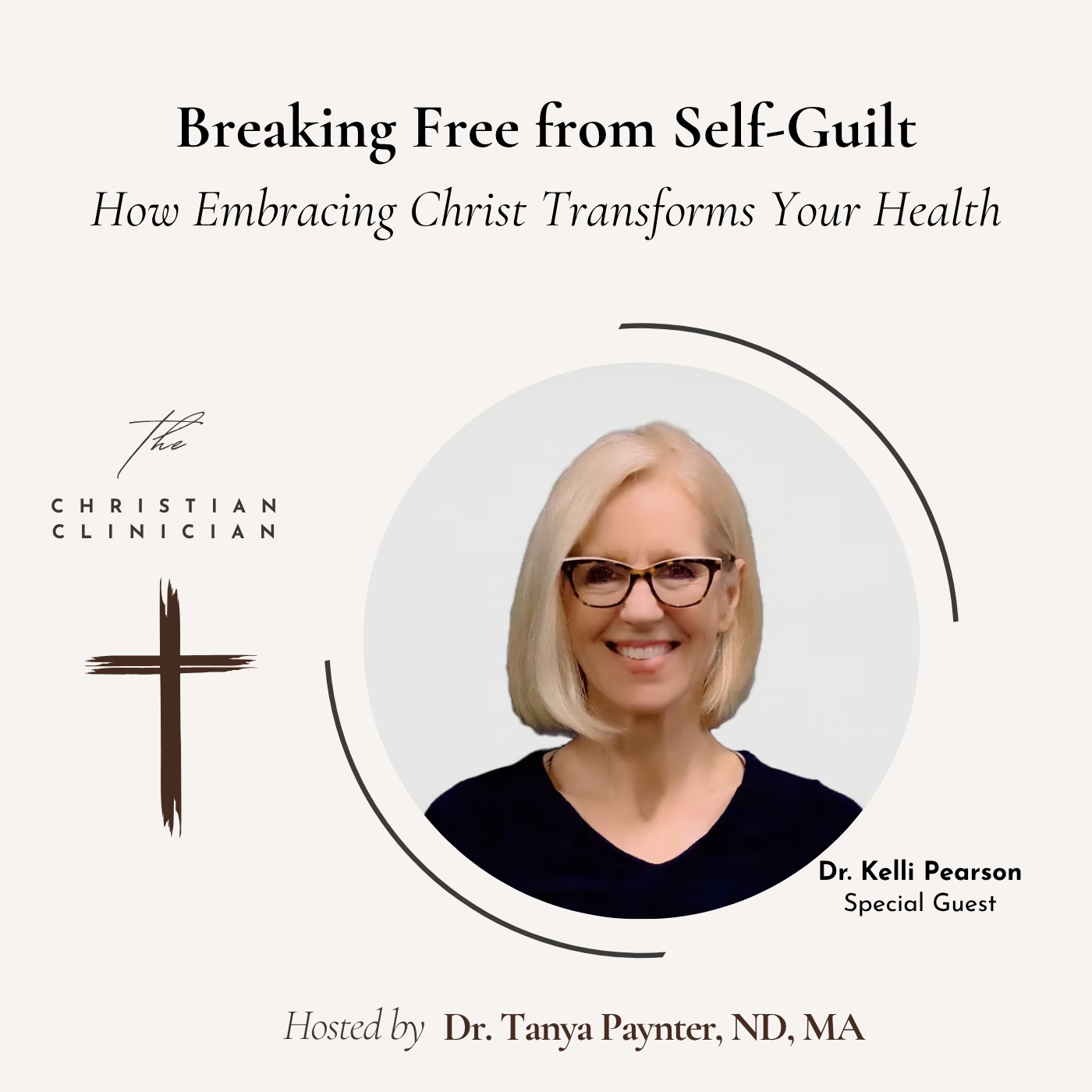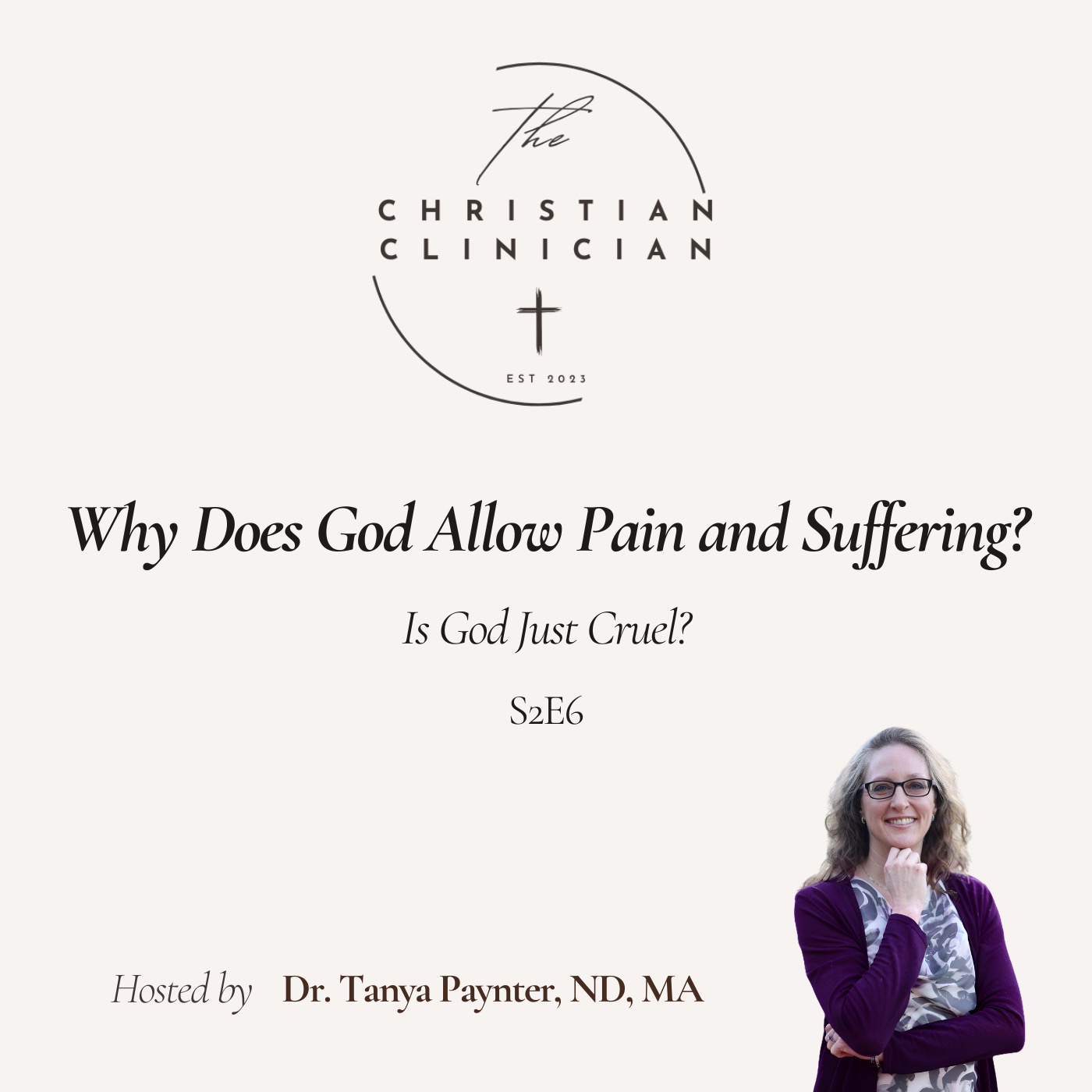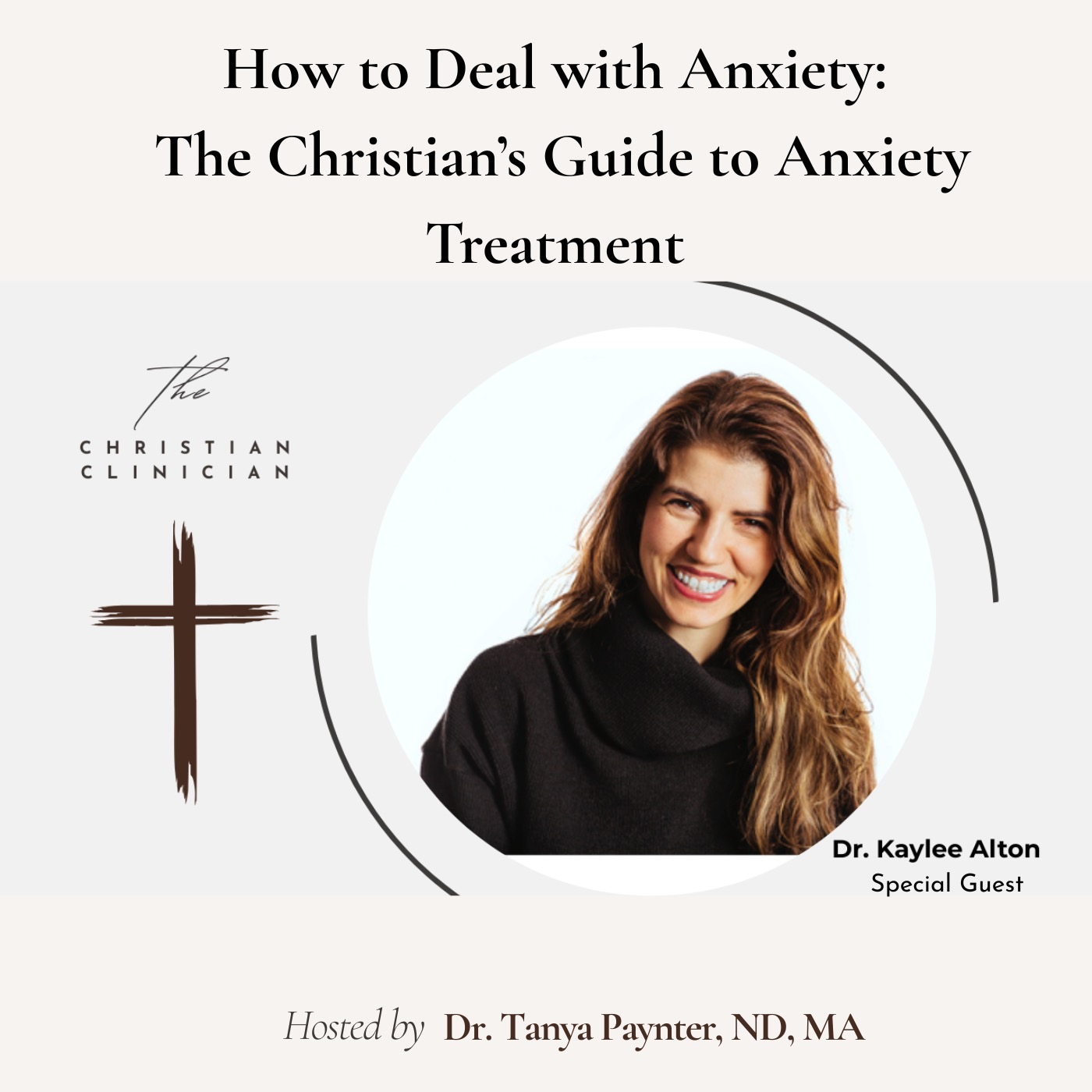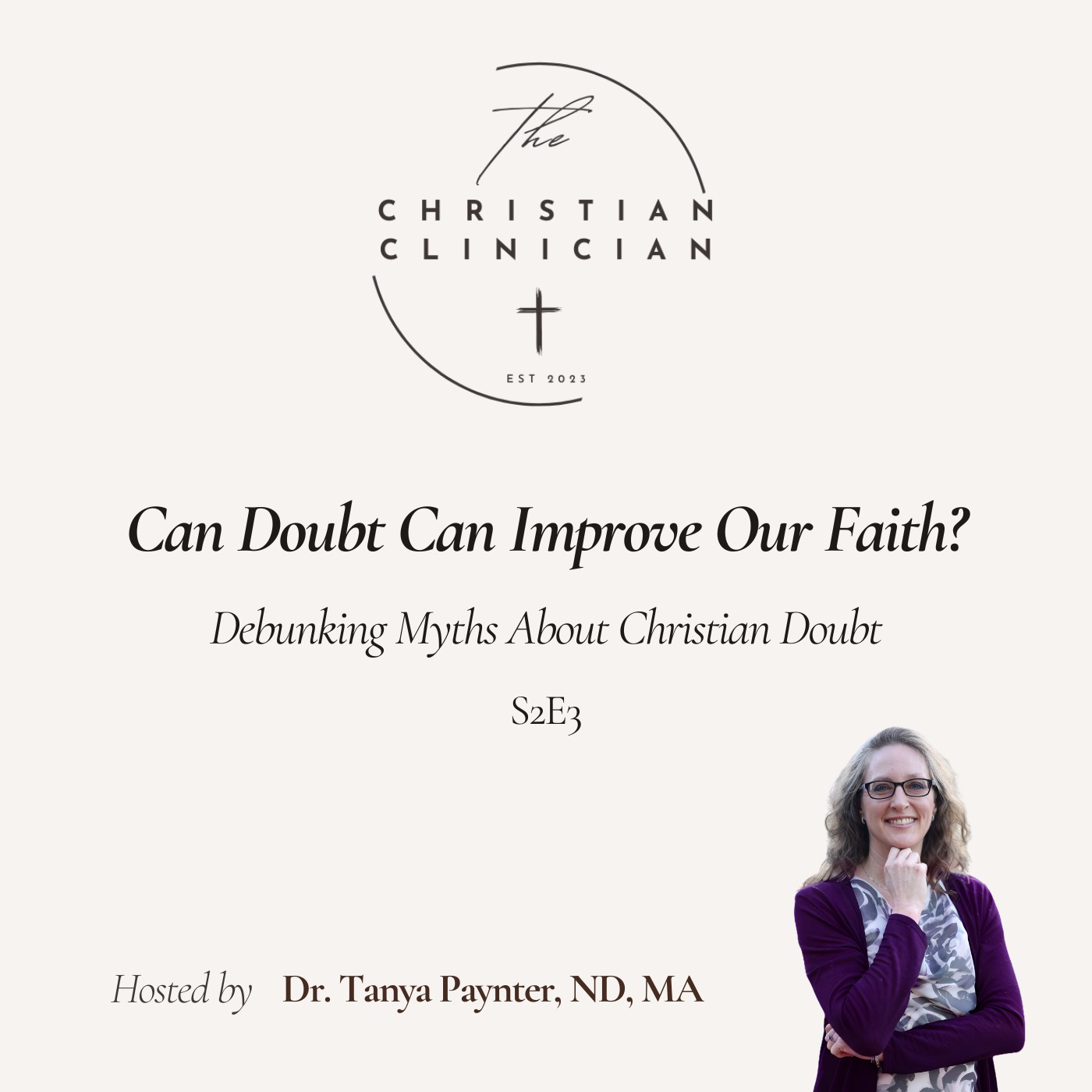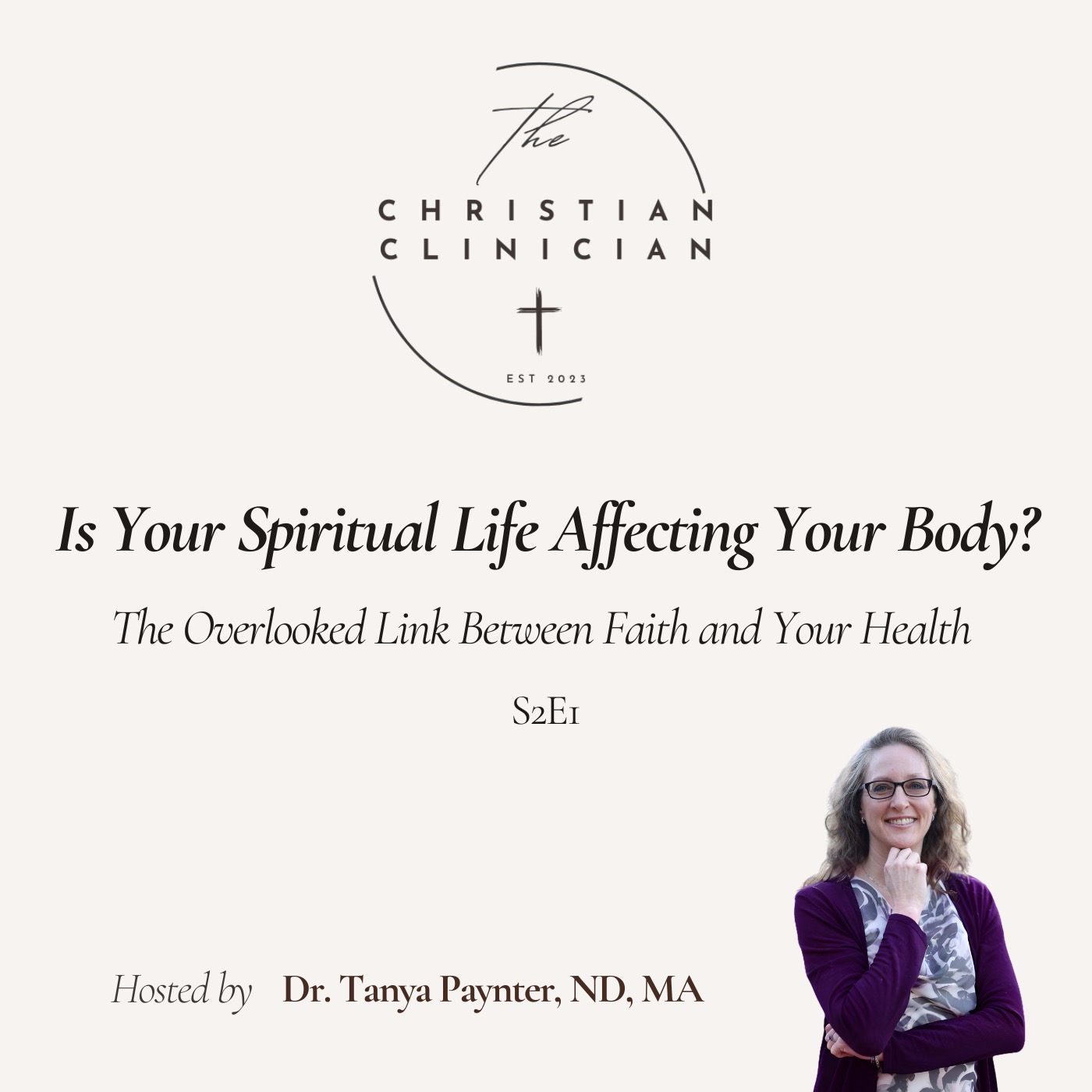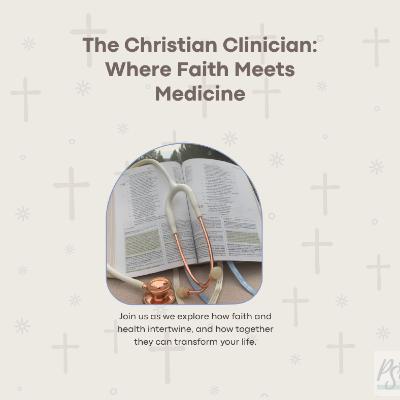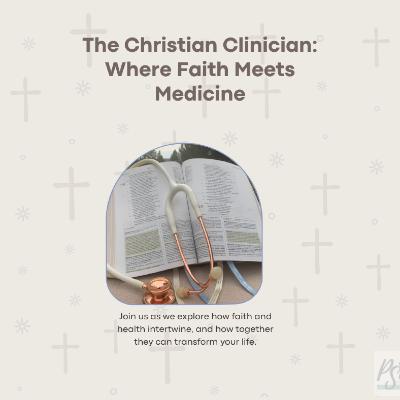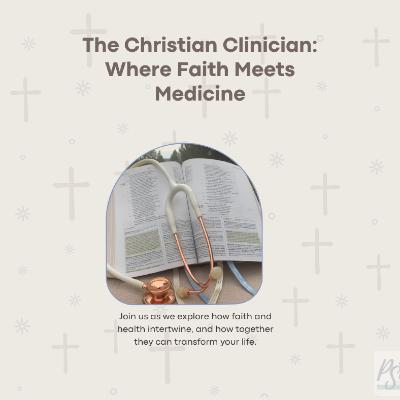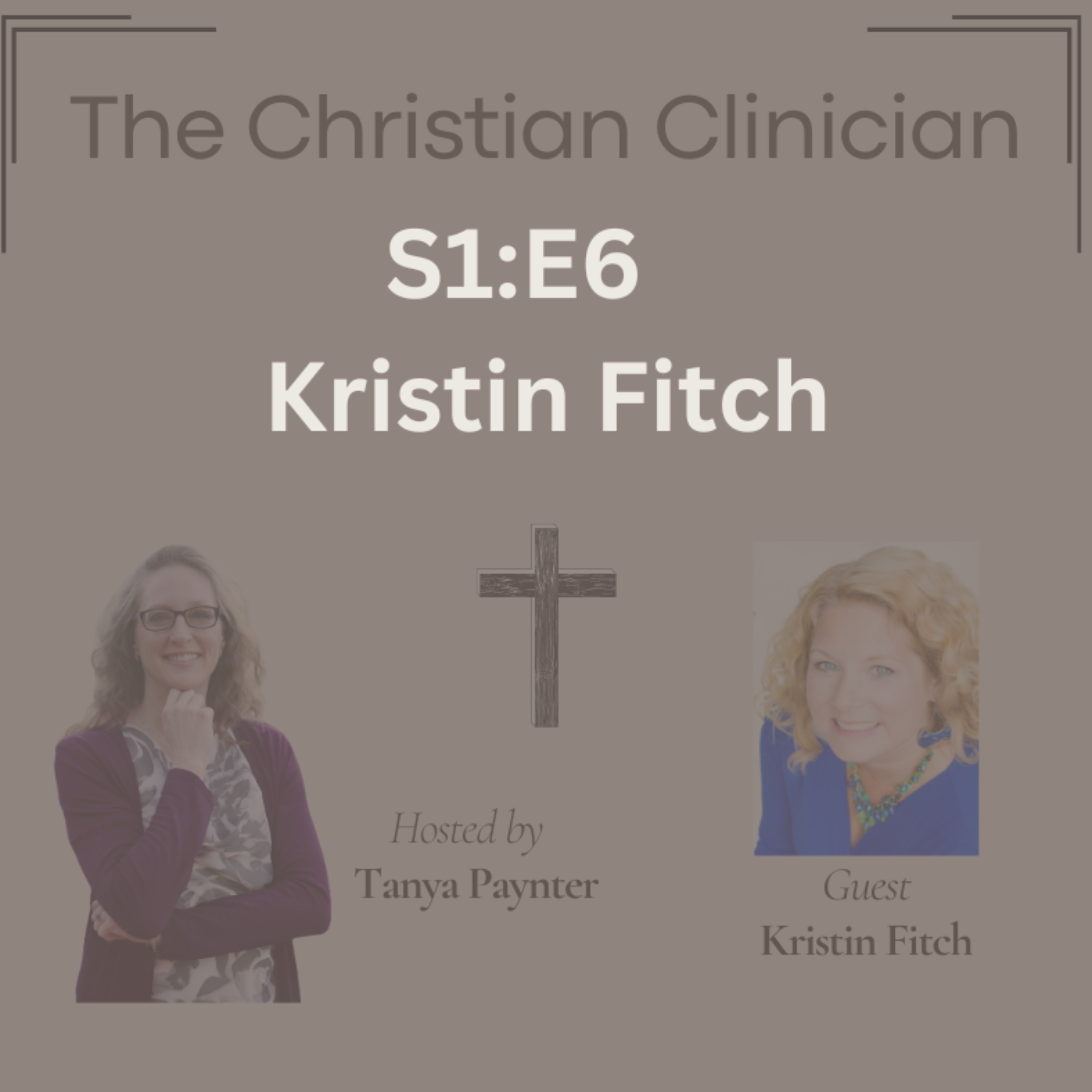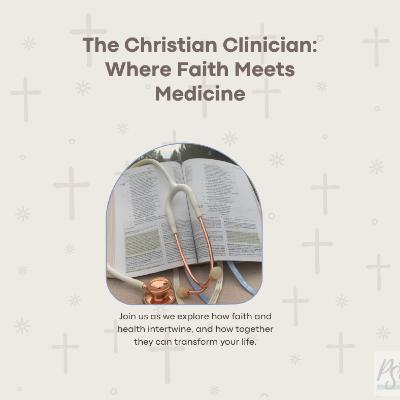Discover The Christian Clinician | Hope, Health, and Wholeness
The Christian Clinician | Hope, Health, and Wholeness

The Christian Clinician | Hope, Health, and Wholeness
Author: Dr. Tanya Paynter
Subscribed: 1Played: 41Subscribe
Share
© 2025 Psalm Medical 2025
Description
Faith and science.
God and the natural world.
Religion and medicine.
We often see these as opposites. But recent studies show that discussing God with their doctor makes people feel more seen, and provide better health outcomes than when spirituality is not a part of the health journey.
We at the Christian Clinician truly believe that ignoring the spiritual health of a person will not only negatively affect the therapeutic doctor/patient relationship but also stunts a patient’s ability to fully heal.
We are made up of three parts – our physical health (always addressed at a doctor visit), our emotional health (sometimes addressed), and our spiritual health (never addressed unless directly brought up by the patient).
The Christian Clinician aims at bringing all three aspects of a person’s health – the physical, the emotional, and the spiritual – to the forefront as part of the whole person.
As clinicians, we need to study and follow the science for best patient outcomes. And the science points to better patient outcomes, better quality of life, better physical and emotional health when we address spiritual health as well.
As Christians, we need to stand for our beliefs and advocate bringing faith back into health care.
The Christian Clinician discusses how various patients and providers bring God and the topic of spiritual and religious practices into their healing and the changes it makes in their outcomes.
"And you shall love the Lord your God with all your heart, with all your SOUL, with all your MIND, and with all your STRENGTH.’"
Mark 12:30
God and the natural world.
Religion and medicine.
We often see these as opposites. But recent studies show that discussing God with their doctor makes people feel more seen, and provide better health outcomes than when spirituality is not a part of the health journey.
We at the Christian Clinician truly believe that ignoring the spiritual health of a person will not only negatively affect the therapeutic doctor/patient relationship but also stunts a patient’s ability to fully heal.
We are made up of three parts – our physical health (always addressed at a doctor visit), our emotional health (sometimes addressed), and our spiritual health (never addressed unless directly brought up by the patient).
The Christian Clinician aims at bringing all three aspects of a person’s health – the physical, the emotional, and the spiritual – to the forefront as part of the whole person.
As clinicians, we need to study and follow the science for best patient outcomes. And the science points to better patient outcomes, better quality of life, better physical and emotional health when we address spiritual health as well.
As Christians, we need to stand for our beliefs and advocate bringing faith back into health care.
The Christian Clinician discusses how various patients and providers bring God and the topic of spiritual and religious practices into their healing and the changes it makes in their outcomes.
"And you shall love the Lord your God with all your heart, with all your SOUL, with all your MIND, and with all your STRENGTH.’"
Mark 12:30
26 Episodes
Reverse
If you’ve ever wondered, “Is this all real?” or feared that your doubts disqualify your faith, you’re not alone—and you’re not a bad Christian. In this deeply personal episode of The Christian Clinician, Dr. Tanya Paynter shares her raw journey through spiritual doubt, exploring what happened when her mind questioned everything she once believed. From emotional exhaustion to physical symptoms, she reveals how hidden doubt can impact your body—and how God invites us to wrestle, not run away. Whether you’ve wrestled with intellectual questions, emotional wounds, or spiritual burnout, this episode gives you biblical truth, clinical research, and practical tools to move from fear into faith. By the end of this episode, you’ll understand the 4 types of doubt, how to identify what you’re really wrestling with, and why questioning God can actually be the start of healing—not the end of your faith.Timestamps00:00 – My story of doubt: “It’s all made up”2:05 – The importance of facing doubts and their effects on faith and health4:05 – Common church and academic responses to questions, and their limitations8:43 – Discovering the field of Christian apologetics11:44 – Defining belief, doubt, faith, and certainty16:42 – Certainty versus doubt and popular misconceptions18:12 – Why doubt is a valuable step in faith development20:52 – Tools for building faith: prayer, fellowship, study, and evidence22:15 – Stories of doubters in Scripture, including Mark 9:24 and Jesus on the cross26:06 – How unresolved spiritual doubt can manifest in physical health issues28:38 – Next week’s episode preview: addressing and resolving doubtsAction Steps• Allow yourself to honestly acknowledge and explore your spiritual doubts without fear or shame.• Seek out reliable resources, such as apologetics books and trusted mentors, to help answer your questions.• Engage in transparent conversations with other believers about doubts to break the isolation.• Understand that doubt is not the opposite of faith, but rather the opposite of certainty, and can be a healthy part of spiritual growth if it’s not ignored but confronted.• Reflect on how unresolved spiritual unrest might be affecting your physical health and prioritize emotional and spiritual self-care.Download the free Doubt Diagnostic Tool to help you identify the kind of doubt you may be experiencing: https://forms.gle/rbxADTHo8aQdeGxi7 Citations and ResourcesBook ResourcesGroothuis, Douglas, and Andrew Shepardson. The Knowledge of God in the World and the Word. Grand Rapids, MI: Zondervan Academic, 2022.Guinness, Os. God in the Dark. Wheaton, IL: Crossway Books, 1996.Habermas, Gary R. The Thomas Factor: Using Your Doubts to Draw Closer to God. Nashville, TN: Broadman & Holman Publishers, 1999.Lewis, C.S. Mere Christianity. 1st ed. New York, NY: Touchstone, 1996.Re Manning, Russell, ed. 30-Second Religion: The 50 Most Thought-Provoking Religious Beliefs, Each Explained in Half a Minute. New York: Metro Books, 2011.Studies and SurveysBockrath, Margaret F., Kenneth I. Pargament, Serena Wong, Valencia A. Harriott, Julie M. Pomerleau, Steffany J. Homolka, Zyad B. Chaudhary, and Julie J. Exline. “Religious and Spiritual Struggles and Their Links to Psychological Adjustment: A Meta-Analysis of Longitudinal Studies.” Psychology of Religion and Spirituality 14, no. 3 (2022): 283–299.Pargament, Kenneth, and Julie J. Exline. “Religious and Spiritual Struggles.” Americal Psychological Association. Last modified November 1, 2020. Accessed March 30, 2025. https://www.apa.org/topics/belief-systems-religion/spiritual-struggles.Thagard, Paul. “What is Doubt and When Is It Reasonable?” Canadian Journal of Philosophy, Supplementary Volume 30. https://www.proquest.com/docview/2715794917“Two-Thirds of Christians Face Doubt.” Barna Group. Last modified July 25, 2017. Accessed April 21, 2025. https://www.barna.com/research/two-thirds-christians-face-doubt/.Bible Verses1 Peter 3:15Romans 12:3Hebrews 11:1–3Jeremiah 29:13Isaiah 1:18Mark 9:24Matthew 27:46John 20:27–29Bio and LinksDr. Tanya Paynter is a naturopathic physician and passionate advocate for the intersection of faith and evidence-based medicine. After a personal journey through spiritual doubt, she pursued a master’s degree in Christian apologetics and now leads conversations to help others revitalize health and renew faith. Dr. Paynter’s unique approach integrates deep theological inquiry with practical clinical wellness, aiming to empower listeners with knowledge, compassion, and truth.Follow The Christian Clinician on Social Media:YouTube: https://www.youtube.com/@TheChristianClinicianFacebook: https://www.facebook.com/TheChristianClinicianInstagram: https://www.instagram.com/christianclinician/Email: JesusHeals@psalmmedical.comEpisode Transcript:https://docs.google.com/document/d/1g4dOp8X8tplm5c87JPYX40mvwRKuxmZ7/edit?usp=sharing&ouid=111320294319945008592&rtpof=true&sd=true
In this episode of The Christian Clinician, host Dr. Tanya Paynter, a wellness expert who integrates faith and evidence-based medicine, tackles the most common objections to the resurrection of Jesus. Drawing on her personal journey through doubt, extensive historical and theological research, and her academic background, she breaks down skeptical arguments and shares logical, evidence-based responses. The discussion covers theories such as mass hallucination, metaphorical resurrection, legend development, the wrong tomb, the swoon theory, and the stolen body theory, offering listeners reasoned rebuttals and practical advice for addressing these issues. Dr. Tanya Paynter empowers listeners with confidence in the historical reliability of the resurrection, emphasizing its foundational impact on faith and everyday life. The episode concludes with a reflection on how understanding the resurrection can reshape priorities and spiritual commitment.Today's Action StepsReflect on the evidence for the resurrection and consider which objections you struggle with most.Make time to research and understand historical and theological sources to strengthen your faith.Journal or meditate on how the resurrection affects your personal priorities and relationship with God.Engage in conversations about these objections with others to practice articulating logical, evidence-based responses.Evaluate your daily routine for ways to prioritize spiritual connection and growth.Resources Mentioned in Today's EpisodeStrobel, Lee. The Case for Christ. Grand Rapids, MI: Zondervan, 1998. Edwards, William D., Wesley J. Gabel, and Floyd E. Hosmer. “On the Physical Death of Jesus Christ.” JAMA 255, no. 11 (March 21, 1986): 1455–63. Groothuis, Douglas. Christian Apologetics: A Comprehensive Case for Biblical Faith. 2nd ed. Downer’s Grove, IL: IVP Academic, 2022. Habermas, Gary R. The Historical Jesus: Ancient Evidence for the Life of Christ. 11th ed. Joplin, MO: College Press Publishing Company, 1996. Habermas, Gary R. The Risen Jesus and Future Hope. Lanham, MD: Rowman and Littlefield Publishers, Inc., 2003. Habermas, Gary R., and Michael R. Licona. The Case for the Resurrection of Jesus. Grand Rapids, MI: Kregel Publications, 2004. Strauss, Mark L. Four Portraits, One Jesus: A Survey of Jesus and the Gospels. 2nd ed. Grand Rapids, MI: Zondervan Academic, 2007. Time Stamps00:00:00 – Introduction and importance of the resurrection00:00:54 – Overview of common objections addressed in this episode00:03:08 – Personal story of doubt and search for logical evidence00:03:36 – Mass hallucination objection debunked00:05:50 – Individual hallucination and large group appearances explained00:06:12 – Metaphorical resurrection theory rebuttal00:07:17 – Addressing the legend and myth development theory00:09:24 – Variations in the Gospel accounts and authenticity of eyewitness testimony00:15:25 – Wrong tomb theory and its rebuttal00:16:09 – The swoon theory and medical evidence against it00:24:44 – The stolen body theory and why it’s unlikely00:29:00 – Role of women witnesses and implications for historical accuracy00:30:21 – Impact of resurrection on daily life and faith00:33:00 – Prioritizing spiritual growth and relationship with God00:37:36 – Focusing on the deeper meaning of the resurrectionDr. Tanya Paynter is a passionate wellness expert, podcast host, and Christian scholar dedicated to linking faith and evidence-based practices for holistic health. Through her podcast The Christian Clinician, she guides listeners in exploring the intersection of wellness and spirituality, helping them revitalize their health and renew their faith with confidence and research-driven insight.Follow The Christian Clinician on Social Media:YouTube: https://www.youtube.com/@thechristianclinicianFacebook: https://www.facebook.com/TheChristianClinicianInstagram: https://www.instagram.com/christianclinician/
In this episode of The Christian Clinician, host Dr. Tanya Paynter launches a three-part apologetic series on the evidence for the resurrection of Jesus, focusing on the "minimal facts argument." As a practitioner who combines faith with evidence-based medicine, Dr. Tanya Paynter discusses how understanding historical evidence for the resurrection can strengthen both faith and well-being. She walks through the first two of five widely accepted minimal historical facts: Jesus’ death by crucifixion and the disciples’ genuine belief in his resurrection. The episode also highlights the value of early oral creeds, extra-biblical accounts, and even medical insights. Dr. Tanya Paynter encourages listeners to engage deeply with the evidence and to let their discoveries inform both mind and spirit.Today's Action StepsInvestigate the minimal facts argument for yourself and assess the level of historical confidence you require when evaluating evidence.Research the dating and significance of the oral creed in 1 Corinthians 15, as referenced in the episode.Reflect on what would motivate you to risk everything for a belief, using the disciples’ transformation as a model.Seek out additional resources on the historical evidence for the resurrection to deepen your own understanding.Recognize the connection between a secure faith and physical health, and allow truth to bring you greater peace.Resources Mentioned in Today's EpisodeStrobel, Lee. The Case for Christ. Grand Rapids, MI: Zondervan, 1998.“CHURCH FATHERS: Contra Celsum, Book II (Origen).” Accessed November 17, 2024. https://www.newadvent.org/fathers/04162.htm.Edwards, William D., Wesley J. Gabel, and Floyd E. Hosmer. “On the Physical Death of Jesus Christ.” JAMA 255, no. 11 (March 21, 1986): 1455–63. https://doi.org/10.1001/jama.1986.03370110077025.Eusebius. “CHURCH FATHERS: Church History, Book II (Eusebius).” Accessed November 22, 2024. https://www.newadvent.org/fathers/250102.htm.Groothuis, Douglas. Christian Apologetics: A Comprehensive Case for Biblical Faith. 2nd ed. Downer’s Grove, IL: IVP Academic, 2022.Habermas, Gary R. The Historical Jesus: Ancient Evidence for the Life of Christ. 11th ed. Joplin, MO: College Press Publishing Company, 1996.Habermas, Gary R. The Risen Jesus and Future Hope. Lanham, MD: Rowman and Littlefield Publishers, Inc., 2003.Habermas, Gary R., and Michael R. Licona. The Case for the Resurrection of Jesus. Grand Rapids, MI: Kregel Publications, 2004.Smithsonian’s Department of Anthropology. Letter. “The Bible as History.” Letter, n.d. https://csnradio.com/wp-content/uploads/2019/12/SmithsonianLetter-o.pdf.Strauss, Mark L. Four Portraits, One Jesus: A Survey of Jesus and the Gospels. 2nd ed. Grand Rapids, MI: Zondervan Academic, 2007.Tacitus. “The Internet Classics Archive | The Annals by Tacitus.” Accessed November 21, 2024. https://classics.mit.edu/Tacitus/annals.11.xv.html.Timestamps02:02 – What counts as historical proof and standards for evaluating ancient events05:24 – An introduction to the minimal facts argument and its five core claims06:28 – Fact #1: The historical documentation of Jesus’ crucifixion08:30 – Synoptic Gospel accounts and extra-biblical corroboration09:46 – Non-Christian sources and archaeological evidence supporting crucifixion11:23 – Medical evidence reviewed by modern physicians12:15 – Debunking the “swoon theory” and affirming Jesus’ actual death13:24 – Fact #2: Evidence for disciples’ genuine belief in Christ’s resurrection13:58 – The disciples’ post-crucifixion transformation and willingness to die for their belief15:28 – Multiple sources confirming unwavering apostolic faith and message16:11 – Consistency of the gospel and non-Christian affirmations16:50 – The unexpected shift in Jewish tradition and rapid adoption of new beliefs17:25 – The dating and importance of the early oral creed in 1 Cor 1523:18 – Reflection: Would you risk everything for your beliefs?24:29 – Romans 10:9 and the personal invitation to faith25:03 – Recap and encouragement to deepen knowledge; invitation to next episode25:57 – Where to find more resources, final encouragement, and closing remarksAbout the HostDr. Tanya Paynter is the host of The Christian Clinician podcast, where she merges faith-based perspectives with evidence-based medicine to help listeners renew both body and spirit. Known for her deep dives into historical and biblical scholarship, she invites experts and thinkers to educate, challenge, and inspire those seeking to join faith with practical health and wellness.Follow The Christian Clinician on Social Media:YouTube: https://www.youtube.com/@thechristianclinicianFacebook: https://www.facebook.com/TheChristianClinicianInstagram: https://www.instagram.com/christianclinician/
In this episode of The Christian Clinician, host Dr. Tanya Paynter sits down with Camille McDaniel, a licensed professional counselor from Georgia and founder of Healing Psychotherapy Practices of Georgia. With over 15 years of experience, Camille McDaniel specializes in helping individuals navigate mental health challenges, work-related stress, trauma, and faith-based reconciliation. The conversation explores the distinction between being a Christian counselor versus a counselor who happens to be Christian, and the importance of integrating faith into therapeutic work. Camille McDaniel shares her journey from childhood aspirations to her current calling, highlights common themes of fear and control among her clients, and emphasizes choosing faith over fear when addressing life’s anxieties and uncertainties. The episode is rich with advice on surrendering control, waiting on God’s timing, and redefining success by God’s standards.Today's Action StepsIdentify an accountability partner to support you as you practice surrendering your worries and plans to God.Begin each day with a simple prayer asking God to help you fully surrender your mind, body, and heart.When you “fall” or find yourself struggling to let go, practice self-compassion and avoid harsh self-judgment.Keep Bible verses about overcoming fear and relying on God’s strength visible as daily reminders of His promises.Regularly check in with your accountability partner and reflect on God’s faithfulness in both big and small decisions.Resources Mentioned in Today's EpisodeHealing Psychotherapy Practices of Georgia: www.healingpsychotherapyga.comEpisode Timestamps02:08 – Camille McDaniel shares her childhood interest in psychology and path to counseling04:52 – Specializations and client challenges, including anxiety, trauma, and spiritual struggles07:10 – Discussion: Christian counselor vs. Christian who counsels09:53 – Integrating faith into the counseling process13:37 – Handling differences in beliefs and nonjudgmental counseling environments18:05 – Common themes: anxiety, fear, and loss of control in today’s culture20:26 – Surrendering goals and waiting on God’s guidance23:21 – Rethinking success from a Christian perspective29:23 – Physical, mental, and spiritual costs of self-reliance36:00 – Practical steps for surrender: accountability, prayer, scripture, and compassion41:02 – Small acts of obedience and God’s care in daily decisions44:52 – Where to find Camille McDaniel for counseling45:31 – Final advice: focus on God’s definition of success and faith over fearAbout the HostDr. Tanya Paynter is the host of The Christian Clinician, where she brings together faith and evidence-based medicine to revitalize your health and renew your faith. With a passion for combining wellness expertise and Christian scholarship, she helps listeners understand how their relationship with God can shape all aspects of their wellbeing.Follow The Christian Clinician on Social Media:YouTube: https://www.youtube.com/@thechristianclinicianFacebook: https://www.facebook.com/TheChristianClinicianInstagram: https://www.instagram.com/christianclinician/
In this episode of The Christian Clinician, host Dr. Tanya Paynter shares a personal story about seeking guidance from God and finding clarity through community at church. Dr. Paynter explores the vital role church and fellowship play not only in spiritual health but also in our biological and neurological well-being. She combines insights from scripture, neurochemistry, and research to illustrate why isolation is detrimental and how gathering with others is essential to our overall healing. Listeners are encouraged to examine their relationship with church attendance, explore roadblocks, and take practical steps toward deeper engagement with both faith and community.Today's Action Steps:Prioritize regular church attendance to nurture your faith and support your healing journey.Pursue hospitality by sharing meals or coffee with fellow believers to deepen relationships.Consider joining a small group or Bible study if traditional church feels overwhelming.Reflect on resistance you may have toward church, writing down your thoughts and praying for clarity.Pay attention to how God may answer prayers through community and interactions with others.Check out the Christian Women's Health Fellowship: www.psalmmedical.comResources Mentioned in Today’s Episode:Book: Douglas Groothuis, Christian Apologetics: A Comprehensive Case for Biblical Faith, 2nd ed. (Downer’s Grove, IL: IVP Academic, 2022).Study: Julianne Holt‐Lunstad, “Social Connection as a Critical Factor for Mental and Physical Health: Evidence, Trends, Challenges, and Future Implications,” World Psychiatry 23, no. 3 (October 2024): 312–332, accessed June 7, 2025, https://www.ncbi.nlm.nih.gov/pmc/articles/PMC11403199/.Early church writings: “Justin_martyr: First Apology - Christian Classics Ethereal Library,” accessed November 13, 2024, https://ccel.org/ccel/justin_martyr/first_apology/anf01.viii.ii.xiii.html.Bible verses: Ephesians 4:16, Romans 12:4-5, Hebrews 10:24-25, Proverbs 27:17, Matthew 18:20, Acts 2:42-46, 1 Corinthians 12:27, 1 Corinthians 3:16, 2 Corinthians 6:16, Ephesians 2:20-22, Titus 1:9, James 3:1, Hebrews 13:17, Genesis 2:18, Colossians 3:16Timestamps:00:00 – Dr. Paynter's car accident and seeking God's guidance00:35 – Realizing answers often come through community01:32 – How church attendance impacts both spiritual and physical health03:03 – The importance of fellowship after personal experience05:32 – Scriptural foundation for gathering as the body of Christ09:00 – The neurological and developmental impact of isolation12:29 – Depression, physical symptoms, and the chemistry of isolation13:07 – Biblical calls for fellowship and the early church model15:57 – The meaning of church (ecclesia) and practical application today19:39 – The necessity of sound teaching in fellowship settings20:54 – Spiritual gifts and the need to work together22:00 – Neurochemistry of shared meals and social bonding24:25 – Scientific research on social connection and health25:12 – Reflecting on and overcoming barriers to church attendance28:13 – Practical steps to increasing community and spotting God's answers30:42 – The relational nature of God and spiritual growth in communityAbout the Host:Dr. Tanya Paynter is a board-certified naturopathic physician and the host of The Christian Clinician. She is passionate about integrating faith with evidence-based medicine to help individuals revitalize their health and renew their faith. Through her podcast, she empowers listeners to discover the profound impact of spiritual community on well-being.Follow The Christian Clinician on Social Media:YouTube: https://www.youtube.com/@thechristianclinicianFacebook: https://www.facebook.com/TheChristianClinicianInstagram: https://www.instagram.com/christianclinician/
In this episode of The Christian Clinician, host Dr. Tanya Paynter shares a personal story about seeking guidance from God and finding clarity through community at church. Dr. Paynter explores the vital role church and fellowship play not only in spiritual health but also in our biological and neurological well-being. She combines insights from scripture, neurochemistry, and research to illustrate why isolation is detrimental and how gathering with others is essential to our overall healing. Listeners are encouraged to examine their relationship with church attendance, explore roadblocks, and take practical steps toward deeper engagement with both faith and community.Today's Action Steps:Prioritize regular church attendance to nurture your faith and support your healing journey.Pursue hospitality by sharing meals or coffee with fellow believers to deepen relationships.Consider joining a small group or Bible study if traditional church feels overwhelming.Reflect on resistance you may have toward church, writing down your thoughts and praying for clarity.Pay attention to how God may answer prayers through community and interactions with others.Resources Mentioned in Today’s Episode:Book: Douglas Groothuis, Christian Apologetics: A Comprehensive Case for Biblical Faith, 2nd ed. (Downer’s Grove, IL: IVP Academic, 2022).Study: Julianne Holt‐Lunstad, “Social Connection as a Critical Factor for Mental and Physical Health: Evidence, Trends, Challenges, and Future Implications,” World Psychiatry 23, no. 3 (October 2024): 312–332, accessed June 7, 2025, https://www.ncbi.nlm.nih.gov/pmc/articles/PMC11403199/.Early church writings: “Justin_martyr: First Apology - Christian Classics Ethereal Library,” accessed November 13, 2024, https://ccel.org/ccel/justin_martyr/first_apology/anf01.viii.ii.xiii.html.Bible verses: Ephesians 4:16, Romans 12:4-5, Hebrews 10:24-25, Proverbs 27:17, Matthew 18:20, Acts 2:42-46, 1 Corinthians 12:27, 1 Corinthians 3:16, 2 Corinthians 6:16, Ephesians 2:20-22, Titus 1:9, James 3:1, Hebrews 13:17, Genesis 2:18, Colossians 3:16Timestamps:00:00 – Dr. Paynter's car accident and seeking God's guidance00:35 – Realizing answers often come through community01:32 – How church attendance impacts both spiritual and physical health03:03 – The importance of fellowship after personal experience05:32 – Scriptural foundation for gathering as the body of Christ09:00 – The neurological and developmental impact of isolation12:29 – Depression, physical symptoms, and the chemistry of isolation13:07 – Biblical calls for fellowship and the early church model15:57 – The meaning of church (ecclesia) and practical application today19:39 – The necessity of sound teaching in fellowship settings20:54 – Spiritual gifts and the need to work together22:00 – Neurochemistry of shared meals and social bonding24:25 – Scientific research on social connection and health25:12 – Reflecting on and overcoming barriers to church attendance28:13 – Practical steps to increasing community and spotting God's answers30:42 – The relational nature of God and spiritual growth in community31:49 – Final encouragements and episode wrap-upAbout the Host:Dr. Tanya Paynter is a board-certified naturopathic physician and the host of The Christian Clinician. She is passionate about integrating faith with evidence-based medicine to help individuals revitalize their health and renew their faith. Through her podcast, she empowers listeners to discover the profound impact of spiritual community on well-being.Follow The Christian Clinician on Social Media:YouTube: https://www.youtube.com/@thechristianclinicianFacebook: https://www.facebook.com/TheChristianClinicianInstagram: https://www.instagram.com/christianclinician/
In this episode of The Christian Clinician, Dr. Tanya Paynter welcomes The Apologetics Guy, Dr. Mikel Del Rosario, a professor of Bible and Theology at the Moody Bible Institute in Chicago and author of "Did Jesus Really Say He Was God?" Dr. Del Rosario, with over 31 journal articles published and extensive experience hosting apologetics podcasts, discusses the historical evidence for Jesus’ divinity claims and the importance of engaging skeptics using both faith and historical methodology. Together, they unpack the “blasphemy accusation scenes” in the Gospel of Mark and examine how historical reliability and cultural context can deepen our understanding of scripture. Dr. Del Rosario shares insights on defending Jesus’ divine authority and practical ways to bridge faith and evidence-based reasoning when discussing apologetics. The conversation is filled with both scholarly knowledge and real-world applications for Christians navigating questions of faith and history.Today's Action StepsFamiliarize yourself with the criteria historians use to assess the reliability of Gospel accounts, such as multiple attestation and dissimilarity.Approach conversations with skeptics by referencing the Bible as a historical document, not just as scripture.Study the cultural and situational context behind biblical passages to gain a more accurate interpretation.Resources Mentioned in Today's EpisodeBook: Did Jesus Really Say He Was God? by Dr. Mikel Del RosarioThe Apologetics Guy Show (podcast, YouTube & Christianity Today Network)Where to find Dr. Mikel Del RosarioWebsite with free sample chapter: https://apologeticsguy.comPurchase the book on Amazon (or other major book retailers):https://www.amazon.com/Did-Jesus-Really-Say-Was/dp/1514011018/Time Stamps00:05 – Explanation of the “blasphemy accusation scenes” in Mark’s Gospel.00:07 – Meaning of the title “Son of Man” and its historical context.00:08 – Defining “divine authority” and Jesus’ unique claims.00:10 – How historians assess the reliability of gospel documents as historical texts.00:14 – Why the Bible faces a higher standard of scrutiny than other ancient texts.00:17 – Importance of cultural and situational context for interpreting scripture.00:20 – Application of historical rules of evidence to Jesus’ miracles and claims.00:26 – Comparison to other religious figures in history and analysis of alleged parallels.00:31 – Detailed response to common critics and their arguments.00:35 – The Pharisees’ reaction as evidence of Jesus’ divine claim.00:41 – Dr. Del Rosario’s final advice: evaluate Jesus’ claims and apply his lordship to all of life.About the HostDr. Tanya Paynter is the creator and host of The Christian Clinician, where she brings together faith and evidence-based medicine to help listeners revitalize their health and renew their faith journeys. With her experience in both healthcare and apologetics, Dr. Paynter is passionate about equipping Christians to navigate complex spiritual and wellness questions with confidence.Follow The Christian Clinician on Social Media:YouTube: https://www.youtube.com/@thechristianclinicianFacebook: https://www.facebook.com/TheChristianClinicianInstagram: https://www.instagram.com/christianclinician/
Episode SummaryIn this episode of The Christian Clinician, host Dr. Tanya Paynter dives into the historical evidence for the existence of Jesus as a real person, exploring both biblical and extra-biblical sources. She reviews eyewitness accounts, writings of early Christian authors, non-Christian historians, and the fulfillment of Old Testament prophecies to build a robust case for the historical Jesus. Through accessible explanations and references, Dr. Paynter provides listeners with a foundation to explore their faith, even amidst doubts and questions about factual evidence.Access the Episode Presentation and Referenceshttps://www.psalmmedical.com/CCdownload-season2Resources Mentioned in Today's Episode (For a full list, please see the episode presentation and references handout here: https://www.psalmmedical.com/CCdownload-season2)Blomberg, Craig L. and Stewart, Robert B. The Historical Reliability of the New Testament: Countering the Challenges to Evangelical Christian Beliefs. Nashville, TN: B&H Academic, 2016.Ehrman, Bart D. Did Jesus Exist? The Historical Argument for Jesus of Nazareth. San Francisco, CA: HarperOne, 2012.Strauss, Mark L. Four Portraits, One Jesus: A Survey of Jesus and the Gospels, 2nd ed. Grand Rapids, MI: Zondervan, 2020.Taylor, Doug E. Jesus Before Constantine: The Church, Her Beliefs, and Her Apologetics. Eugene, OR: Wipf & Stock, 2020.Kaiser, Walter C. Jr. The Messiah in the Old Testament. Grand Rapids, MI: Zondervan Publishing, 1995.McDowell, Josh. Evidence That Demands a Verdict. San Bernardino, CA: Campus Crusade for Christ, 1972.Stoner, Peter W. and Newman, Robert C. Science Speaks: Scientific Proof of the Accuracy of Prophecy and the Bible. Chicago, IL: Moody Press Chicago, 1958.Willmington, Harold. “The Old Testament Prophecies Fulfilled by Jesus Christ.” The Second Person File, 2018, accessed May16, 2024, https://digitalcommons.liberty.edu/second_person/162.Timestamps0:00–1:00 | Comparing historical evidence for Jesus versus Alexander the Great1:01–2:00 | Introduction to the historical Jesus mini-series and episode overview2:01–6:05 | Biblical evidence for Jesus’ existence, focusing on Paul’s letters and eyewitness accounts6:06–10:43 | Paul’s testimony, early Christian experiences, and the social changes sparked by Jesus’ teachings10:44–15:04 | Evidence from early Christian authors and extra-biblical sources15:05–18:36 | Input from non-Christian historians like Josephus, Tacitus, and Pliny the Younger18:37–24:39 | Old Testament prophecies fulfilled by Jesus and the statistical improbability of coincidence24:40–29:37 | Timeline for early documentation and summary of the overwhelming historical record29:38–End | Preview of next week’s guest and episode; Dr. Paynter’s encouragement and closing adviceAbout the HostDr. Tanya Paynter is a clinician who uniquely integrates faith with evidence-based medicine. Through The Christian Clinician podcast, she explores the intersection of health, wellness, and Christian faith, tackling difficult questions about belief, Scripture, and health from both a scientific and spiritual lens. Her thoughtful and informative interviews help listeners revitalize both their physical health and their spiritual journey.Follow The Christian Clinician on Social Media:YouTube: https://www.youtube.com/@thechristianclinicianFacebook: https://www.facebook.com/TheChristianClinicianInstagram: https://www.instagram.com/christianclinician/
In this episode of The Christian Clinician, Dr. Tanya Paynter explores the surprising health benefits of fellowship from both a biblical and scientific perspective. Dr. Paynter, who brings years of experience in naturopathic medicine and group health coaching, explores why robust social connections can provide powerful health breakthroughs that may not be achieved with supplements or medications alone. She references both scripture and compelling research studies, demonstrating how true community with others plays a vital role in physical and spiritual well-being. From actionable prayer strategies to practical steps for building meaningful relationships, this episode will surprise you at the power of fellowship.Today's Action Steps:Pray for God to soften your heart towards building new friendships and to bring the right people into your life.Set aside short, manageable time commitments each week to invite a neighbor or friend for tea or a chat.Intentionally reach out to others in your church or community who may seem isolated and help draw them in.Consider forming or joining a small group, support circle, or starting a walking group before Bible study.Consider becoming a part of the Christian Women's Health Fellowship.Resources Mentioned in Today’s Episode:“U.S. Dietary Supplements Market Size | Industry Report, 2033,” accessed October 8, 2025, https://www.grandviewresearch.com/industry-analysis/us-dietary-supplements-market-report.Julianne Holt-Lunstad, Timothy B. Smith, and J. Bradley Layton, “Social Relationships and Mortality Risk: A Meta-Analytic Review,” PLOS Medicine 7, no. 7 (July 27, 2010): e1000316, accessed October 8, 2025, https://journals.plos.org/plosmedicine/article?id=10.1371/journal.pmed.1000316.Office of the Surgeon General, “Social Connection,” US Department of Health and Human Services, last modified February 19, 2025, https://www.hhs.gov/surgeongeneral/reports-and-publications/connection/index.html.Julianne Holt-Lunstad et al., “Loneliness and Social Isolation as Risk Factors for Mortality: A Meta-Analytic Review,” Perspectives on Psychological Science: A Journal of the Association for Psychological Science 10, no. 2 (March 2015): 227–237.Shanshan Li et al., “Association of Religious Service Attendance With Mortality Among Women,” JAMA Internal Medicine 176, no. 6 (June 1, 2016): 777, accessed October 8, 2025, http://archinte.jamanetwork.com/article.aspx?doi=10.1001/jamainternmed.2016.1615.S. Cohen et al., “Social Ties and Susceptibility to the Common Cold,” JAMA 277, no. 24 (June 25, 1997): 1940–1944.Fredrik Backman, A Man Called Ove, trans. Henning Koch (London: Sceptre, 2014).Ecclesiastes 4:12, Galatians 6:2, Hebrews 10:24-25, Acts 2:42-47, Matthew 18:20, Ephesians 2:19 (Scripture references)Where to connect with the Christian Women's Health Fellowship:Email: support@psalmmedical.comWebsite: www.psalmedical.comTimestamps:01:18 – Bible and science: Gathering together is essential for both physical and spiritual health.04:35 – Dr. Paynter shares her personal journey from isolation to valuing fellowship.06:18 – Research on complex social connections.09:56 – Key statistics: Social isolation’s impact on heart disease, dementia, and wellbeing.12:28 – Practical steps for introverts and those resistant to socializing.13:50 – The importance of prayer in building a desire for community.15:21 – Small, simple steps to expand your social network and prioritize relationships.20:34 – Book highlight: “A Man Called Ove” as an illustration of the power of community.22:55 – Encouragement to consider how your presence in others’ lives can impact them.24:42 – Helping those who struggle with small talk or social engagement become integrated.25:22 – Biblical purpose of fellowship: unity, endurance, healing, and obedience.27:57 – Launch of the Christian Women's Health Fellowship for naturopathic, faith-based health support.31:14 – Details and invitation to join the new fellowship community.Dr. Tanya Paynter is a licensed naturopathic physician, experienced health coach, and passionate educator who weaves together faith, medicine, and practical lifestyle advice for Christian women. Through her podcast, The Christian Clinician, she empowers listeners to pursue whole-person wellness grounded in biblical truth and evidence-based care.Follow The Christian Clinician on Social Media:YouTube: https://www.youtube.com/@thechristianclinicianFacebook: https://www.facebook.com/TheChristianClinicianInstagram: https://www.instagram.com/christianclinician/
In this episode of The Christian Clinician, Dr. Tanya Paynter welcomes Dr. Kelly Pearson, a chiropractic physician with over 40 years of experience and author of "Eight Minutes to Ageless." Dr. Pearson shares her powerful journey from a Catholic upbringing, through decades of New Age exploration, and ultimately back to an active Christian faith during the COVID-19 pandemic. She discusses how her renewed relationship with Christ has transformed both her personal life and clinical practice, emphasizing holistic health, posture, and spiritual well-being. The episode touches on forgiveness, self-worth in Christ, and practical ways to age well—physically, spiritually, and emotionally.Today's Action StepsGet comfortable with being uncomfortable: Step out of daily routines and expose yourself to new experiences (like cold exposure) to boost resilience.Lead with your heart: Practice standing and moving with an upright, heart-forward posture for improved confidence and connection.Prioritize daily movement: Practice 12 cardinal ranges of motion each day to retain mobility and prevent the signs of aging.Embrace quiet time: Spend a few minutes daily in stillness and spiritual reading to foster personal development and openness to God.Address unforgiveness: Recognize the impact of forgiveness (including self-forgiveness) and invite spiritual conversation into your healing journey.Resources Mentioned in Today's EpisodeBook: "Eight Minutes to Ageless" by Dr. Kelly PearsonWhere to find Dr. Kelly Pearsonhttps://www.8minutestoageless.com/ (Book support site and videos)https://www.pearsonweary.com/ (Practice resources, videos, and health information)Timestamps00:00 – Introduction to Dr. Kelly Pearson and her faith journey02:00 – Growing up Catholic, exploring New Age, and returning to Christianity06:00 – The impact of COVID-19 on spiritual life and rediscovering faith08:00 – Dr. Pearson’s philosophy on aging, movement, and simplifying wellness12:40 – How faith has transformed Dr. Pearson’s clinical practice and patient care16:45 – Integrating spiritual conversations with patients and the role of forgiveness24:10 – Practical mental exercises for self-forgiveness and viewing oneself through God's eyes26:20 – Daily habits: embracing discomfort, posture, and spiritual reading33:01 – The importance of stillness and listening for God’s guidance38:39 – Final thoughts: never too late to make healthy choices; encouragement to listenersAbout Dr. Tanya Paynter:Dr. Tanya Paynter is the host of The Christian Clinician, where she combines faith and evidence-based medicine to help listeners revitalize their health and renew their faith. Passionate about integrating Christian values with holistic health, she brings real, informative conversations to help listeners understand their God-given purpose and the impact of spiritual well-being on physical health.Follow The Christian Clinician on Social Media:YouTube: https://www.youtube.com/@thechristianclinicianFacebook: https://www.facebook.com/TheChristianClinicianInstagram: https://www.instagram.com/christianclinician/
If you’ve ever wondered where God is during life’s darkest moments, know that countless others have asked the same question. In this episode of The Christian Clinician, Dr. Tanya Paynter tackles one of the hardest questions Christians ask: Why does God allow so much pain? Through the raw story of a family who lost both of their children, Dr. Paynter explores how suffering doesn’t mean God has abandoned you, and how deep pain can lead to deeper faith. She walks through the emotional and theological struggle of loss, and shows how a shift in perspective and priorities can radically reshape how we think about pain, purpose, and God’s presence in the midst of suffering. This episode equips offers biblical truths, compassionate insight, and actionable steps to help you move forward, challenging you to consider that God’s view of your life, and what truly matters, may be far different from your own. By the end of this episode, you’ll understand why God allows suffering, how He meets us in it, and what steps you can take today to begin healing with Him at the center.Timestamps00:00:01 – Introducing the theme: pain, suffering, and why God allows tragedy00:01:16 – The story of a devout Christian family's grief and loss00:02:44 – Understanding God's nature and scripture's response to evil00:03:20 – The purpose of suffering and God’s eternal perspective00:06:14 – Defining good, evil, and the human perspective on suffering00:07:08 – Insights from C.S. Lewis on pain, control, and God’s providence00:12:04 – The free will defense and philosopher Alvin Plantinga’s reasoning00:13:39 – Addressing the logical problem of evil: is God all good, all powerful?00:14:36 – God’s perspective on suffering, spiritual growth, and comfort00:16:01 – The limits of human understanding vs. God’s eternal view00:18:35 – Personal reflection: addressing anger or blame towards God00:20:17 – Three practical steps to heal your relationship with God00:22:51 – Jesus’s suffering and role as redeemer of pain00:24:05 – Letting questions lead you closer to Jesus, not away00:24:44 – Final reflections: suffering as a path to deeper faith and healingAction StepsToday's Action Steps:· Start with scripture: Choose a verse to focus on and let it speak for you when words fail.· Pray in surrender: Instead of asking for answers to "why," pray for acceptance, peace, and trust in God's goodness.· Listen to your body: Notice physical symptoms of emotional or spiritual distress and journal to process unresolved feelings with God.· Allow yourself to bring anger, sorrow, and questions to God, knowing He can handle your emotions and doubts.Link to the Episode Worksheet - Wrestling With God Reflection Journalhttps://www.psalmmedical.com/CCdownload-season2Citations and ResourcesLewis, C.S. The Problem of Pain. 1st ed. New York, NY: Touchstone, 1996.Plantinga, Alvin. “The Free Will Defense” in The Problem of Evil : Selected Readings. Notre Dame, Ind: University of Notre Dame Press, 1992.Guinness, Os. God in the Dark. Wheaton, IL: Crossway Books, 1996.Bible VersesPsalm 5:4"For you are not a God who delights in wickedness; evil may not dwell with you."Psalm 34:18"The Lord is near to the brokenhearted and saves the crushed in spirit."Isaiah 43:2"When you pass through the waters, I will be with you; and through the rivers, they shall not overwhelm you; when you walk through fire you shall not be burned, and the flame shall not consume you."2 Peter 3:9"The Lord is not slow to fulfill his promise as some count slowness, but is patient toward you, not wishing that any should perish, but that all should reach repentance."1 Timothy 2:2–4"That we may lead a peaceful and quiet life, godly and dignified in every way. This is good, and it is pleasing in the sight of God our Savior, who desires all people to be saved and to come to the knowledge of the truth."Colossians 3:2"Set your minds on things that are above, not on things that are on earth."Philippians 3:20"But our citizenship is in heaven, and from it we await a Savior, the Lord Jesus Christ."2 Timothy 3:12"Indeed, all who desire to live a godly life in Christ Jesus will be persecuted."Isaiah 55:8–9"For my thoughts are not your thoughts, neither are your ways my ways, declares the Lord. For as the heavens are higher than the earth, so are my ways higher than your ways and my thoughts than your thoughts."Matthew 5:10"Blessed are those who are persecuted for righteousness' sake, for theirs is the kingdom of heaven."2 Corinthians 4:17–18"For this light momentary affliction is preparing for us an eternal weight of glory beyond all comparison, as we look not to the things that are seen but to the things that are unseen."Psalm 119:71"It is good for me that I was afflicted, that I might learn your statutes."Deuteronomy 31:6"Be strong and courageous. Do not fear or be in dread of them, for it is the Lord your God who goes with you. He will not leave you or forsake you."Romans 8:38–39"For I am sure that neither death nor life, nor angels nor rulers, nor things present nor things to come, nor powers, nor height nor depth, nor anything else in all creation, will be able to separate us from the love of God in Christ Jesus our Lord."Revelation 21:4"He will wipe away every tear from their eyes, and death shall be no more, neither shall there be mourning, nor crying, nor pain anymore, for the former things have passed away."Deuteronomy 29:29"The secret things belong to the Lord our God, but the things that are revealed belong to us and to our children forever, that we may do all the words of this law."Revelation 10:4"And when the seven thunders had sounded, I was about to write, but I heard a voice from heaven saying, 'Seal up what the seven thunders have said, and do not write it down.'"2 Corinthians 12:4"And he heard things that cannot be told, which man may not utter."Daniel 12:9"He said, 'Go your way, Daniel, for the words are shut up and sealed until the time of the end.'"Bio and LinksDr. Tanya Paynter is a dedicated physician and Christian thought leader who founded The Christian Clinician podcast to unite faith and science. Her goal is to help listeners revitalize their health while renewing and deepening their relationship with God. Each episode features candid, thoughtful discussions on topics at the intersection of spiritual growth, health, and Christian living.Follow The Christian Clinician on Social Media:YouTube: https://www.youtube.com/@thechristianclinicianFacebook: https://www.facebook.com/TheChristianClinicianInstagram: https://www.instagram.com/christianclinician/
In this episode of The Christian Clinician, host Dr. Tanya Paynter welcomes Dr. Kaylee Alton, a licensed naturopathic doctor with over 12 years of experience in chronic conditions, including complex digestive, immune, and hormone health challenges. Dr. Alton is also the founder of the Confident Hormone Club and an educator within church communities throughout North America on the intersection of holistic health and spiritual growth. Together, they explore anxiety from both a faith-based and evidence-based perspective, discussing the importance of addressing not only physical symptoms but also spiritual well-being. Dr. Kaylee shares her personal and professional journey, including overcoming church hurt, and provides practical strategies to incorporate faith into managing anxiety.Today's Action Steps:• Start by understanding and tracking your physical symptoms; learn how diet, sleep, and lifestyle impact your anxiety.• Build your faith through daily practices like prayer, worship, and studying scripture, making these regular disciplines.• Intentionally declare and meditate on Bible verses related to peace and anxiety to help rewire your thought patterns.• Seek out clinical lab work to identify any underlying nutrient deficiencies or hormonal imbalances contributing to anxiety.• Practice community and fellowship with other believers to support spiritual and emotional resilience.Resources Mentioned in Today's Episode:Dr. Kaylee’s List of ScripturesExodus 14:14"The Lord will fight for you, and you have only to be silent."Psalm 23:1"The Lord is my shepherd; I shall not want."Psalm 29:11"May the Lord give strength to his people! May the Lord bless his people with peace!"Psalm 37:23–24"The steps of a man are established by the Lord, when he delights in his way; though he fall, he shall not be cast headlong, for the Lord upholds his hand."Isaiah 54:17"No weapon that is fashioned against you shall succeed, and you shall refute every tongue that rises against you in judgment. This is the heritage of the servants of the Lord and their vindication from me, declares the Lord."John 14:27"Peace I leave with you; my peace I give to you. Not as the world gives do I give to you. Let not your hearts be troubled, neither let them be afraid."Philippians 4:19"And my God will supply every need of yours according to his riches in glory in Christ Jesus."Isaiah 41:13"For I, the Lord your God, hold your right hand; it is I who say to you, ‘Fear not, I am the one who helps you.’"Where to find Dr. Kaylee Alton:• Website: theconfidenthormoneclub.com• TikTok: @DrKayleeAltonEpisode Timestamps: 00:00 – Introduction to church shifts and spiritual trauma 04:48 – The impact of church hurt and the process of faith deconstruction 06:26 – The importance of daily physical health choices 07:36 – Balancing spiritual and physical causes of anxiety 09:03 – Applying scripture: Casting anxieties on God 14:34 – The role of community and ongoing prayer 16:12 – Science-backed benefits of worship and gratitude practices 20:22 – Taking every thought captive and practical Bible verse usage 25:19 – Physical care enhancing spiritual capacity 29:29 – Understanding and tracking your body’s symptoms 30:29 – Building faith and adding discipline to spiritual practices 33:20 – Importance of lab work and investigative steps About the Host: Dr. Tanya Paynter is a naturopathic doctor and passionate advocate for integrating Christian faith with evidence-based medicine to help listeners renew their health and strengthen their spiritual lives. She specializes in holistic approaches to chronic health issues and enjoys fostering honest, informative conversations with medical experts and faith leaders.Follow The Christian Clinician on Social Media:YouTube: https://www.youtube.com/@thechristianclinicianFacebook: https://www.facebook.com/TheChristianClinicianInstagram: https://www.instagram.com/christianclinician/
In this episode, Dr. Tanya Paynter continues her deeply personal and insightful conversation on how doubt impacts both our faith and our health. Building on last week’s story of her own spiritual struggles, she dives into the four distinct types of doubt—factual, experiential, emotional, and volitional—and explains why identifying them is essential for true healing. Dr. Paynter shares practical tools, biblical examples, and honest reflection exercises to help Christian women work through their doubts. She also debunks three common myths many believers hold:1) That most Christians don’t experience doubt,2) That doubt is sinful or shameful,3) That facts alone should remove doubt.This episode offers encouragement and practical guidance for any Christian mom seeking holistic health with God at the center.Timestamps00:00 – Introduction to Doubt03:21 - Examples of types of doubts06:59 - How doubt can strengthen faith when addressed13:18 - How clarifying beliefs can improve your relationship with God14:58 - Biblical examples of doubt and God’s responses15:37 - Reflection prompts to help identify your own doubts21:27 - Practical tips for naming and addressing your doubts23:33 - Encouragement that God welcomes your questions and doubtsAction Steps1) Identify the type of doubt you are experiencing: use the Doubt Diagnostic Tool to help you (link below)2) Pray and journal about your doubts; ask God for guidance and clarity3) Choose a physical practice—such as walking, stretching, or breath prayer—to help manage stress as you work through uncertainty.4) Seek support from trusted friends, counselors, or within your community, especially for doubts connected to trauma or emotional pain.Download the free Doubt Diagnostic Tool to help you identify the kind of doubt you may be experiencing: https://forms.gle/rbxADTHo8aQdeGxi7Citations and ResourcesBook ResourcesGroothuis, Douglas, and Andrew Shepardson. The Knowledge of God in the World and the Word. Grand Rapids, MI: Zondervan Academic, 2022.Guinness, Os. God in the Dark. Wheaton, IL: Crossway Books, 1996.Habermas, Gary R. The Thomas Factor: Using Your Doubts to Draw Closer to God. Nashville, TN: Broadman & Holman Publishers, 1999.Lewis, C.S. Mere Christianity. 1st ed. New York, NY: Touchstone, 1996.Re Manning, Russell, ed. 30-Second Religion: The 50 Most Thought-Provoking Religious Beliefs, Each Explained in Half a Minute. New York: Metro Books, 2011.Studies and SurveysBockrath, Margaret F., Kenneth I. Pargament, Serena Wong, Valencia A. Harriott, Julie M. Pomerleau, Steffany J. Homolka, Zyad B. Chaudhary, and Julie J. Exline. “Religious and Spiritual Struggles and Their Links to Psychological Adjustment: A Meta-Analysis of Longitudinal Studies.” Psychology of Religion and Spirituality 14, no. 3 (2022): 283–299.Pargament, Kenneth, and Julie J. Exline. “Religious and Spiritual Struggles.” Americal Psychological Association. Last modified November 1, 2020. Accessed March 30, 2025. https://www.apa.org/topics/belief-systems-religion/spiritual-struggles.Thagard, Paul. “What is Doubt and When Is It Reasonable?” Canadian Journal of Philosophy, Supplementary Volume 30. https://www.proquest.com/docview/2715794917“Two-Thirds of Christians Face Doubt.” Barna Group. Last modified July 25, 2017. Accessed April 21, 2025. https://www.barna.com/research/two-thirds-christians-face-doubt/.Bible VersesMatthew 27:46Matthew 11:11Hebrews 12:1–2Bio and LinksDr. Tanya Paynter is a naturopathic physician and passionate advocate for the intersection of faith and evidence-based medicine. After a personal journey through spiritual doubt, she pursued a master’s degree in Christian apologetics and now leads conversations to help others revitalize health and renew faith. Dr. Paynter’s unique approach integrates deep theological inquiry with practical clinical wellness, aiming to empower listeners with knowledge, compassion, and truth.Follow The Christian Clinician on Social Media:YouTube: https://www.youtube.com/@TheChristianClinicianFacebook: https://www.facebook.com/TheChristianClinicianInstagram: https://www.instagram.com/christianclinician/Email: JesusHeals@psalmmedical.comEpisode Transcript:https://docs.google.com/document/d/1zR5aT91L2LGFw6eT_r0By7jafho1TPSV/edit?usp=sharing&ouid=111320294319945008592&rtpof=true&sd=true
In this powerful episode of The Christian Clinician, Dr. Tanya Paynter, a former police officer turned naturopathic doctor, shares her deeply personal story of trauma, PTSD, and spiritual healing. After surviving a deadly officer-involved shooting, she battled severe anxiety, insomnia, and even physical health struggles like hormone imbalance and miscarriage. But healing didn’t come from medicine alone—it came through Scripture, prayer, and a return to faith.This episode is a must-listen for Christian moms navigating anxiety, chronic stress, or spiritual disconnection. You’ll learn why spiritual health is essential to emotional and physical well-being, how doubt can manifest as disease, and practical steps to begin aligning your health journey with God’s design.By the end of this episode, you’ll understand how your spiritual life might be the missing piece in your healing journey—and know what to do next.Timestamps01:30 – Dr. Tanya’s personal story: PTSD, miscarriage, and hormone imbalance04:23 – Reaching for the Bible and the start of spiritual healing 05:31 – The science behind spiritual health and physical symptoms08:10 – Broken heart syndrome as evidence for the soul-body link 11:56 – The importance of confronting doubts for health and faith 14:53 – Reflective questions for personal spiritual assessment 19:38 – How spiritual doubts or unresolved issues can drive physical symptoms 20:50 – Practical application: Track your symptoms, reflect spiritually 23:32 – Gospel message: Jesus as our healer and comforter 24:28 – Recap and Invitation Action StepsToday's Action Steps· Track both your physical symptoms and spiritual challenges daily to identify potential connections between the two.· Set aside intentional, quality time for prayer or connection with God, especially when facing emotional or physical struggles.· Reflect on your current coping mechanisms and consider whether you are turning to faith or other sources for comfort.· Journal about your doubts, questions, or struggles related to faith, and seek answers rather than suppressing them.· Review key scriptures to reinforce the link between your spiritual well-being and overall health.Link to the Symptom and Faith Tracking Worksheethttps://www.psalmmedical.com/CCsignup-season2Citations and ResourcesResources Mentioned in Today's EpisodeBaetz, Marilyn, and Rudy Bowen. “Chronic Pain and Fatigue: Associations with Religion and Spirituality.” Pain Research & Management : The Journal of the Canadian Pain Society 13, no. 5 (2008): 383–388. Accessed April 27, 2025. https://www.ncbi.nlm.nih.gov/pmc/articles/PMC2799261/.Francesco Pelliccia et al., “Pathophysiology of Takotsubo Syndrome,” Circulation 135, no. 24 (June 13, 2017): 2426–2441, accessed May 15, 2025, https://www.ahajournals.org/doi/10.1161/CIRCULATIONAHA.116.027121. Koenig, Harold G. (Harold George). Handbook of Religion and Health. Oxford ; New York : Oxford University Press, 2012.Koenig, H. G., L. K. George, J. C. Hays, D. B. Larson, H. J. Cohen, and D. G. Blazer. “The Relationship between Religious Activities and Blood Pressure in Older Adults.” International Journal of Psychiatry in Medicine 28, no. 2 (1998): 189–213.Schnell, Tatjana, Dietmar Fuchs, and René Hefti. “Worldview Under Stress: Preliminary Findings on Cardiovascular and Cortisol Stress Responses Predicted by Secularity, Religiosity, Spirituality, and Existential Search.” Journal of Religion and Health 59, no. 6 (2020): 2969–2989. Accessed April 6, 2025. http://link.springer.com/10.1007/s10943-020-01008-5.Bible VersesGenesis 1:27“So God created man in his own image, in the image of God he created him; male and female he created them.”Genesis 2:7“Then the Lord God formed the man of dust from the ground and breathed into his nostrils the breath of life, and the man became a living creature.”1 Corinthians 15:44“It is sown a natural body; it is raised a spiritual body. If there is a natural body, there is also a spiritual body.”Job 19:25–26“For I know that my Redeemer lives, and at the last he will stand upon the earth.And after my skin has been thus destroyed, yet in my flesh I shall see God.”Ecclesiastes 12:7“And the dust returns to the earth as it was, and the spirit returns to God who gave it.”Philippians 3:20–21“But our citizenship is in heaven, and from it we await a Savior, the Lord Jesus Christ,who will transform our lowly body to be like his glorious body, by the power that enables him even to subject all things to himself.”Hebrews 4:15–16“For we do not have a high priest who is unable to sympathize with our weaknesses, but one who in every respect has been tempted as we are, yet without sin.Let us then with confidence draw near to the throne of grace, that we may receive mercy and find grace to help in time of need.”Matthew 11:28–30“Come to me, all who labor and are heavy laden, and I will give you rest.Take my yoke upon you, and learn from me, for I am gentle and lowly in heart, and you will find rest for your souls.For my yoke is easy, and my burden is light.”Jeremiah 29:13 (spoken in transcript as 23:13)“You will seek me and find me, when you seek me with all your heart.”Bio and LinksDr. Tanya Paynter is a naturopathic doctor with a deep-rooted passion for holistic health and Christian faith. Holding degrees from the University of Washington, Bastyr University, and Colorado Christian University, Dr. Paynter brings a unique perspective that bridges evidence-based medicine with spiritual wellness. Her personal journey through trauma and healing informs her compassionate, faith-centered approach, supporting others seeking transformative health.Follow The Christian Clinician on Social Media:YouTube: https://www.youtube.com/@thechristianclinicianFacebook: https://www.facebook.com/TheChristianClinicianInstagram: https://www.instagram.com/christianclinician/
In this thought provoking episide, Dr. Tanya Paynter explores the often-perceived conflict between science and faith, offering Christian moms and women of faith a new perspective on integrating both into their lives. In this episode, Dr. Paynter dives into historical misconceptions, such as the trials of Galileo and Scopes, and how these events were misunderstood as conflicts between science and the Church. Rather than being opposing forces, she explains how science and faith together reveal a more complete picture of God’s creation—where science answers the “how” and faith answers the “why.”
You'll be encouraged to see science as a path to understanding God’s handiwork, rather than something that detracts from faith. With engaging stories of renowned scientists like Galileo, Newton, and Francis Collins who saw science as a bridge to their Creator, Dr. Paynter emphasizes that Christian values were actually foundational to the growth of scientific inquiry. She encourages listeners to investigate their own faith questions deeply, drawing closer to God as they find answers.
Join us in this episode to discover how your love for Christ and curiosity for His creation can coexist beautifully and support your Christian journey.
Today's Action Steps:
Investigate historical events critically to understand the real story behind popular myths.
Seek out the historical context behind popular science vs. religion stories.
Explore both scientific and religious perspectives to form a well-rounded worldview.
Question popular versions of history and seek evidence-based information.
Engage with current thinkers and consider the coexistence of evolution and biblical creation.
Utilize both the "book of nature" and the Bible to understand God's creation more deeply.
Resources Mentioned in Today's Episode:
"Can Science Explain Everything?" by John Lennox
"History of the Conflict between Religion and Science" by John William Draper
"A History of the Conflict between Science and Religion" by Andrew Dixon White
Francis Collins' work
Lee Strobel’s investigations
William Lane Craig's arguments
C.S. Lewis' writings
"The Kalam Cosmological Argument" by Al Ghazali
Time Stamps:
[00:00:00] Overview of science vs faith debate and conflict theory introduction.
[00:00:33] Science provides empirical evidence and religion provides meaning.
[00:01:23] Professor John Lennox’s analogy on boiling water and perspectives.
[00:02:15] Historical background: John William Draper and Andrew Dixon White.
[00:04:06] Misconceptions about Galileo’s trial clarified.
[00:06:52] Galileo’s political and legal challenges, not scientific suppression.
[00:08:43] Misconception: Conflict between Christianity and science.
[00:10:02] Importance of Christianity in advancing modern science.
[00:12:15] Evidence for faith in God and arguments like the Kalam cosmological argument.
[00:14:49] Clarification on the Scopes trial and its implications.
[00:16:05] Coexistence of evolution and biblical creation advocated by modern thinkers.
[00:17:08] Encouragement to seek answers to sciency questions and grow closer to God.
Host Bio: Dr. Tanya Paynter is the host of The Christian Clinician is a passionate advocate of integrating faith with empirical study. She aims to bridge the gap between science and religion through informed discussions and encourages her audience to deepen their understanding of both realms.
About the Host
Dr. Tanya Paynter, the host of The Christian Clinician, is a passionate advocate of integrating faith with empirical study. She aims to bridge the gap between science and religion through informed discussions and encourages her audience to deepen their understanding of God using both lines of thinking.
Follow The Christian Clinician on Social Media:
YouTube: https://www.youtube.com/@thechristianclinicianFacebook: https://www.facebook.com/TheChristianClinicianInstagram: https://www.instagram.com/christianclinician/
In this episode of The Christian Clinician, Dr. Tanya Paynter talks with Dr. Tabatha Barber, a triple board-certified obstetrician, gynecologist, and functional medicine practitioner. Dr. Tabatha shares her journey from being a high school dropout and teenage mom to a thriving physician, crediting her faith for guiding her through both her personal and professional life. Listeners will learn how her approach integrates spiritual health with physical and mental well-being.
Dr. Tabatha discusses the importance of reconnecting with God to find holistic health, and how fasting, gratitude, and biblical journaling can transform both mindset and body. With insights from her bestselling book, Fast to Faith: A 40-Day Awakening, she explains how practices like fasting and mindful prayer align the mind, body, and spirit. She also explores the biochemical impact of thoughts and the power of belief in healing, emphasizing the value of faith in achieving true health.
Today's Action Steps:
Practice journaling to connect with God and seek guidance.
Embrace gratitude to shift from a stressed to a restorative state.
Future gaze with God to envision and align your desired future with daily actions.
Incorporate fasting and prayer to foster spiritual growth and personal transformation.
Find a healthcare provider who aligns with your beliefs and values for holistic care.
Link to the Episode Worksheet: Click here
Resources Mentioned in Today's Episode:
Book: "Fast to Faith: A 40 Day Awakening" by Dr. Tabatha Barber
Podcast: "The Gutsy Gynecologist Show"
Where to find Dr. Tabatha Barber:
Book and more information:
fasttofaith.com
Functional practitioner services:
drtabatha.com
Time Stamps:
00:00 Introduction to Dr. Tabatha Barber and her credentials.
03:15 Dr. Barber shares her early life challenges and their impact.
08:23 The traumatic delivery experience and its transformative effect.
11:50 Journey back to education and medical career driven by faith.
18:40 Overcoming burnout and the importance of self-care and boundaries.
25:30 Connecting physical health, mindset, and spirituality.
33:18 The power of the mind in health and reprogramming the brain.
38:45 Thoughts, feelings, and the body's chemical responses.
42:30 Benefits of journaling and seeking divine guidance.
47:10 Incorporating faith in medical practice and personal health.
53:02 Dr. Barber’s transition from conventional to functional medicine.
01:00:00 Valuing holistic health approaches and patient-provider alignment.
01:05:15 Final advice: Trust God's plan and maintain faith during difficult times.
About the Host: Dr. Tanya Paynter is the dedicated host of The Christian Clinician podcast. She shares her insights into integrating faith and health, providing a platform for discussions that inspire and educate. With a passion for holistic wellness, she engages with guests to explore spiritual, mental, and physical well-being.
Follow The Christian Clinician on Social Media:
YouTube @thechristianclinicianFacebook @thechristianclinicianInstagram @christianclinician
In this episode of The Christian Clinician, Dr. Tanya Paynter explores the deep connection between our unconscious beliefs about God and their impact on both emotional and physical health. Cognitive dissonance—a disconnect between what we consciously believe and what we unconsciously feel—can lead to spiritual confusion, heightened anxiety, and physical ailments such as chronic pain and increased inflammation.
Dr. Paynter draws from both scientific research and biblical wisdom, such as Paul’s struggle in Romans 7:15, to highlight how unaddressed spiritual doubts can manifest in real-world symptoms. By examining her personal journey of reconciling her faith with her health, she offers a pathway for Christian women to explore their beliefs, work through doubts, and ultimately, find peace and healing through a deeper understanding of God.
Today's Action Steps
Reflect on your religious beliefs and explore the evidence surrounding them.
Allow yourself to openly acknowledge and discuss doubts without fear or guilt.
Integrate prayer and seeking God's guidance as part of addressing health issues.
Aim to align unconscious beliefs with your conscious behaviors to achieve spiritual harmony.
Resources Mentioned in Today's Episode
John A. Bargh and Ezequiel Morsella, “The Unconscious Mind,” Perspectives on psychological science : a journal of the Association for Psychological Science 3, no. 1 (January 2008): 73, accessed October 24, 2024, https://pmc.ncbi.nlm.nih.gov/articles/PMC2440575/.
Tatjana Schnell, Dietmar Fuchs, and René Hefti, “Worldview Under Stress: Preliminary Findings on Cardiovascular and Cortisol Stress Responses Predicted by Secularity, Religiosity, Spirituality, and Existential Search,” Journal of Religion and Health 59, no. 6 (March 27, 2020): 2969, accessed October 24, 2024, https://pmc.ncbi.nlm.nih.gov/articles/PMC7677289/.
Time Stamps
0:00
— Introduction to cognitive dissonance and its relevance to faith and health.
5:12
— Dr. Tanya Paynter poses questions about the Bible's divine origin and infallibility.
10:25
— Importance of exploring and openly discussing doubts about religious beliefs.
15:40
— Personal journey of reconciling faith and overcoming cognitive dissonance.
20:50
— Impact of cortisol and stress on physical and emotional health.
25:30
— Critique of the healthcare system's lack of spiritual consideration.
30:15
— Emphasizing the need for a solid foundation in faith for emotional stability.
35:47
— Final advice from Dr. Tanya Paynter on integrating faith with health practices.
Host Bio
Dr. Tanya Paynter is the host of "The Christian Clinician" podcast where she explores the intersection between faith and evidence-based medicine. She offers unique insights into how religious beliefs impact overall health and well-being. Dr. Paynter encourages open discussions about doubts and struggles in faith and invites listeners to engage with her on these important topics.
Follow The Christian Clinician on Social Media:YouTube: https://www.youtube.com/@thechristianclinicianFacebook: https://www.facebook.com/TheChristianClinicianInstagram: https://www.instagram.com/christianclinician/
Related Links:
Read our blog post on Cognitive Dissonance in Faith: How Unconscious Beliefs Affect Your Spiritual and Physical Health for more insights on the link between spiritual and emotional wellbeing.
Episode Summary
In this episode of The Christian Clinician, Dr. Tanya Paynter speaks with Cameisha Brewer, a licensed professional counselor and experienced therapist, about the intersection of mental health and faith. Cameisha brings over a decade of expertise in the mental health field, with a focus on helping high-achieving, professional women navigate anxiety and stress. She discusses her journey from working at an inpatient psychiatric facility to running her own private practice, adapting to telehealth, and the specific challenges her clients face. The conversation emphasizes the importance of addressing mental health within the Christian community without guilt or stigma.
Today's Action Steps
Prioritize self-care to manage screen fatigue and stress, especially if working in virtual settings.
Establish a daily reset routine to recharge your body and mind after intensive screen time.
Upgrade your work environment, such as using a standing desk, to promote physical well-being.
Acknowledge and address mental health challenges even if you are highly successful in other areas.
Resources Mentioned in Today's Episode
The CEO Clinician: available for purchase at https://www.cbrewerconsulting.com/ceoclinicianbook
Where to find Cameisha Brewer
Facebook - https://www.facebook.com/cbrewerconsulting
Instagram - https://www.instagram.com/cameishabrewer/
LinkedIn - https://www.linkedin.com/in/cameisha-brewer-ed-s-lpc-ncc-0828287a/
Youtube - https://www.youtube.com/channel/UCPHJqF3THfiVqOLrSi8UWyA
Website - https://www.cbrewerconsulting.com
Episode Time Stamps
00:00:01 - Discussion on guilt associated with anxiety and depression.
00:00:29 - Introduction to The Christian Clinician podcast.
00:00:51 - Dr. Tanya Paynter welcomes Cameisha Brewer and gives her credentials.
00:01:42 - Cameisha Brewer shares her background and journey.
00:02:51 - Current state of Cameisha's life and career in mental health.
00:03:10 - Cameisha discusses her private practice and transition to telehealth.
00:04:22 - Challenges of high-achieving women with high-functioning anxiety.
00:04:25 - Adaptation and differences in practicing telehealth.
Host Bio
Dr. Tanya Paynter is the host of The Christian Clinician, a podcast dedicated to integrating faith with evidence-based medicine to improve health and renew faith. She engages with wellness experts and Christian scholars to provide insightful and informative conversations.
Follow The Christian Clinician on Social Media:YouTube: https://www.youtube.com/@thechristianclinicianFacebook: https://www.facebook.com/TheChristianClinicianInstagram: https://www.instagram.com/christianclinician/
Summary of the Episode
In this episode, Dr. Tanya Paynter welcomes Kristin Fitch, a Christian encourager, speaker, author, and podcaster, who shares her journey of overcoming a severe head injury. Kristin discusses her health challenges, the significance of a positive mindset, and the intertwining of faith and health. Her credentials include hosting the podcasts "Faith Fueled Women" and "Building a Life You Love," as well as running a faith-based lifestyle and educational company.
Today's Action Steps
Practice "microgratitude" by appreciating small daily moments as part of maintaining a positive mindset.
Stay connected with friends and loved ones through texting and phone calls, even when unable to visit physically.
Incorporate purposeful activities like gardening, art, music, and baking to promote mental and physical well-being.
Engage in grounding practices such as walking barefoot on natural surfaces to connect with earth's electrons.
Be persistent and take an active role in advocating for your own health, seeking out holistic and faith-integrated healthcare options.
Link to the Episode Worksheet
Resources Mentioned in Today's Episode
Podcasts: "Faith Fueled Women," "Building a Life You Love"
Books, scriptures, and impactful quotes referenced for journaling and reflection
Where to Find Kristin Fitch
Kristin Fitch hosts "Faith Fueled Women" and "Building a Life You Love" podcasts.
https://kristinfitch.com
https://kristinfitch.com/devotional/ - Joyful Living Devotional
Episode Time Stamps
[00:00] Introduction of guest, Kristin Fitch, and her background
[03:15] Initial experience with head injury and gradual symptom development
[08:40] Focusing on gratitude and positive thinking during recovery
[13:22] The importance of social connections for overcoming chronic illness
[18:50] Utilizing faith practices in everyday life for emotional resilience
[24:10] Benefits of purposeful activities like gardening on mental health
[29:05] Emphasizing the value of being a health advocate
[34:20] Guest’s final advice on integrating faith and well-being
Host Bio
Dr. Tanya Paynter is the host of "The Christian Clinician," a podcast that integrates faith and evidence-based medicine to support listeners' health and spiritual journeys. She engages with wellness experts and Christian scholars to provide insightful and encouraging content for revitalizing health and faith.
Follow The Christian Clinician on Social Media:YouTube: https://www.youtube.com/@thechristianclinicianFacebook: https://www.facebook.com/TheChristianClinicianInstagram: https://www.instagram.com/christianclinician/
Episode Summary
In this episode, Dr. Tanya Paynter dives into the fascinating world of mitochondria, the powerhouse of the cell, and its crucial role in energy production and overall health. Dr. Paynter explores how mitochondrial dysfunction can contribute to a range of chronic illnesses like anxiety, depression, migraines, and chronic fatigue syndrome. She integrates this scientific discussion with a biblical perspective, addressing the concept of generational curses and how our faith can play a vital role in maintaining our health. Dr. Paynter also touches on how lifestyle and medication choices can impact mitochondrial function and offers insights into incorporating faith into healthcare.
Today's Action Steps
Consider supplements like CoQ10, L-carnitine, and fish oil to support mitochondrial function.
Evaluate the use of medications and consult with a healthcare provider about potential long-term effects.
Prioritize spiritual health through regular Bible study and prayer for an integrated approach to wellness.
Implement lifestyle changes like improving diet and exercise to enhance overall health.
Practice grounding by spending time outdoors, walking barefoot on natural surfaces.
Link to Episode Worksheet
https://gamma.app/docs/The-Christian-Clinician--9btwxmvu4aj7gc1?mode=doc
Resources Mentioned in Today's Episode
Galatians 5:19-21 (Bible, New Testament)
Exodus 20:5 (Bible, Old Testament)
Strong's Concordance (Biblical reference tool)
Studies Referenced
Kramer P, Bressan P. Our (Mother's) Mitochondria and Our Mind. Perspect Psychol Sci. 2018 Jan;13(1):88-100. doi: 10.1177/1745691617718356. Epub 2017 Sep 22. PMID: 28937858; PMCID: PMC5761714.
Sharma N, Pasala MS, Prakash A. Mitochondrial DNA: Epigenetics and environment. Environ Mol Mutagen. 2019 Oct;60(8):668-682. doi: 10.1002/em.22319. Epub 2019 Aug 6. PMID: 31335990; PMCID: PMC6941438.
Time Stamps
00:00:08 - Introduction to the episode and mitochondria.
00:01:06 - Exploring mitochondria's role and connection to chronic illnesses.
00:03:03 - The importance of mitochondrial DNA and neurotransmitter breakdown.
00:05:41 - Identifying red flags for mitochondrial dysfunction in chronic illness.
00:07:28 - Impact of medications on mitochondrial function.
00:09:01 - Biblical perspective: Galatians 5:20 and the concept of pharmakea.
00:15:43 - Integrating faith and health; balancing medication use.
00:18:10 - Personal testimony on faith, health, and the impact of a stronger relationship with God.
00:21:22 - Encouragement to prioritize spiritual health for overall well-being.
00:22:52 - Practical tips for supporting mitochondrial function.
About the Host
Dr. Tanya Paynter is the host of "The Christian Clinician," where she expertly blends faith with evidence-based medicine to offer a holistic approach to health. She is passionate about helping individuals revitalize their health and deepen their relationship with God. Follow The Christian Clinician on Social Media:
YouTube: The Christian ClinicianFacebook: The Christian ClinicianInstagram: Christian Clinician


